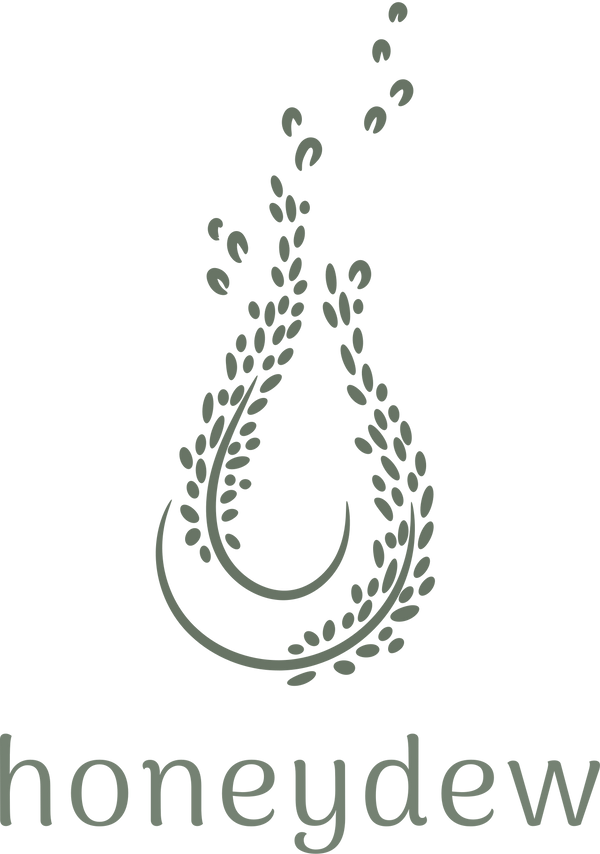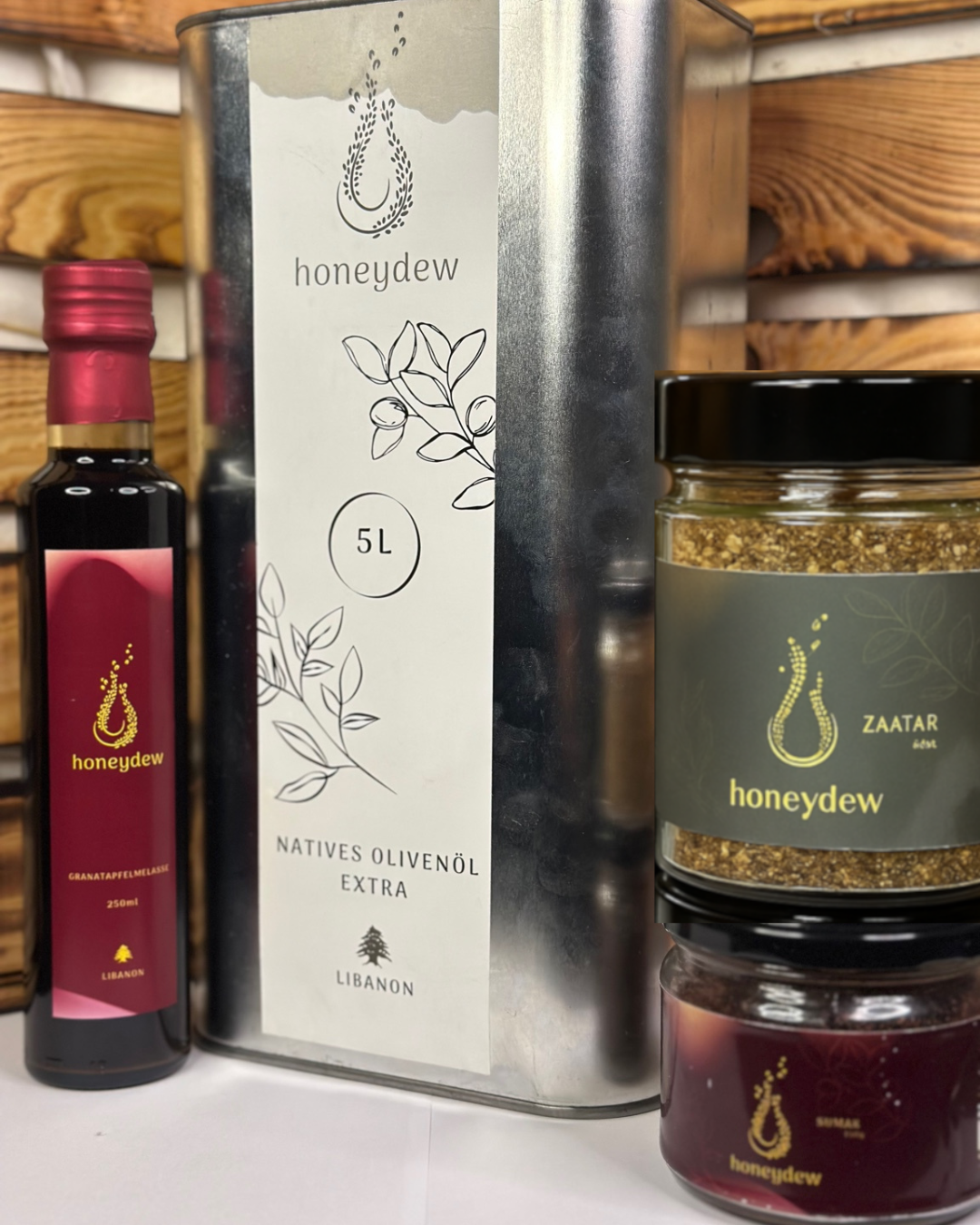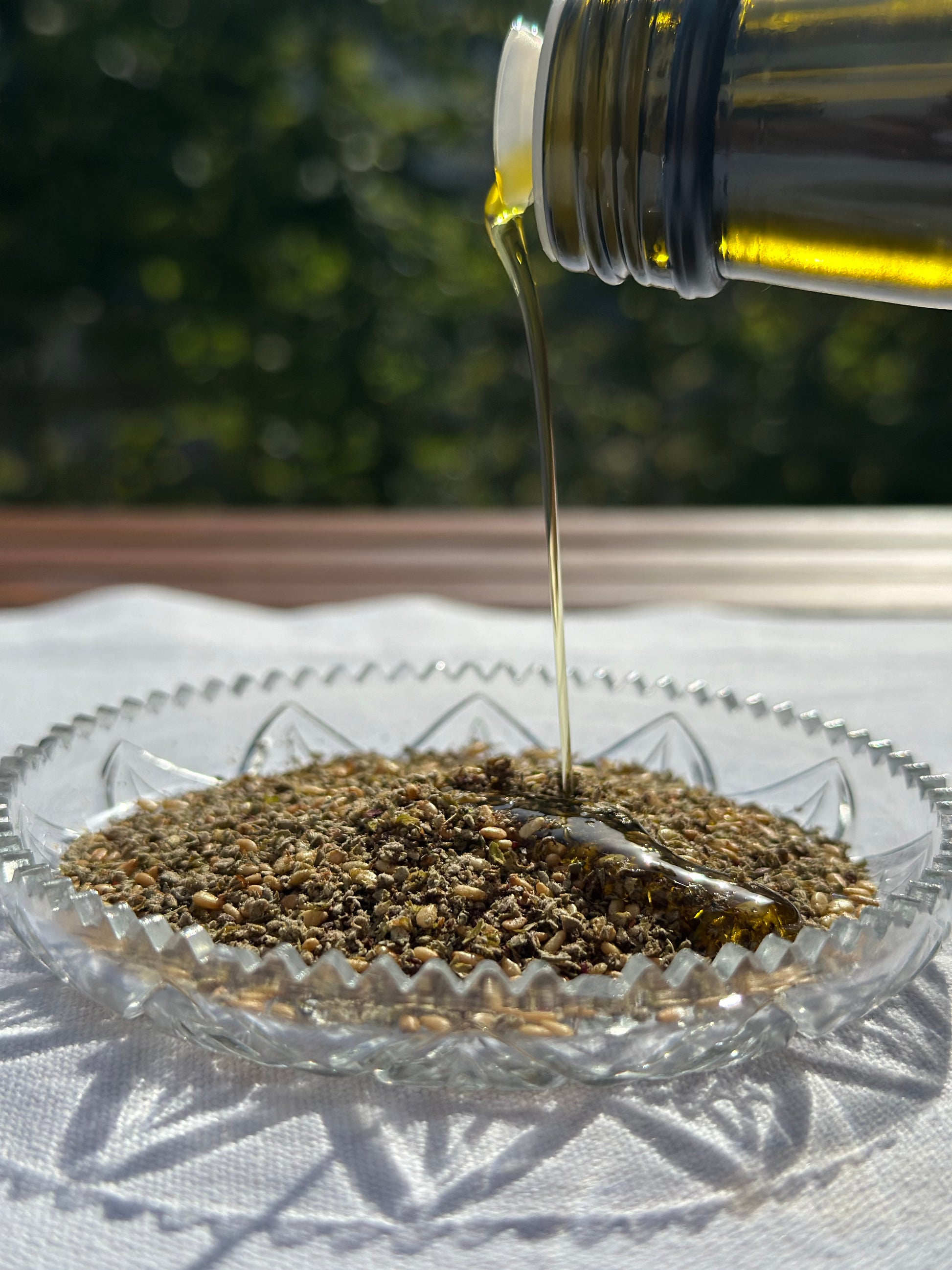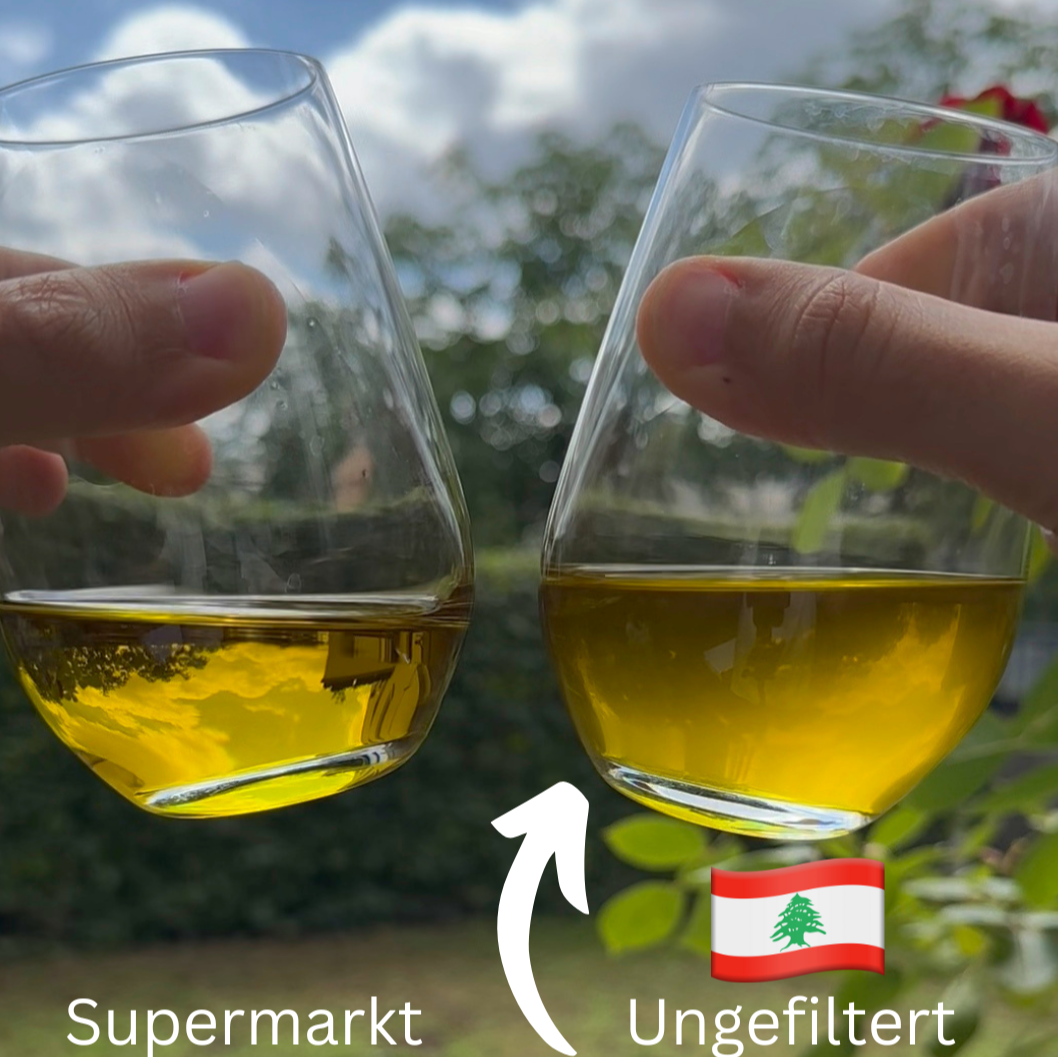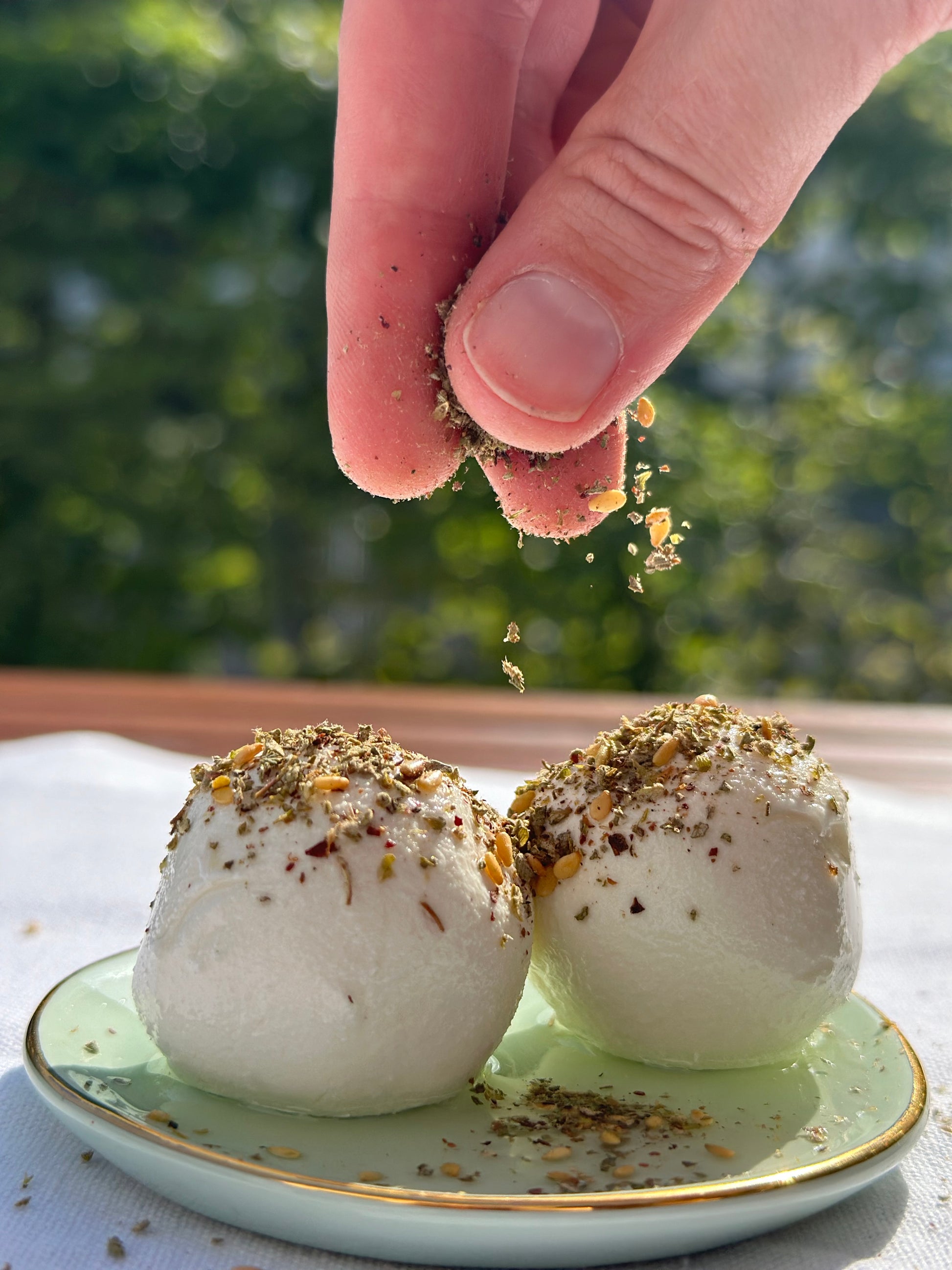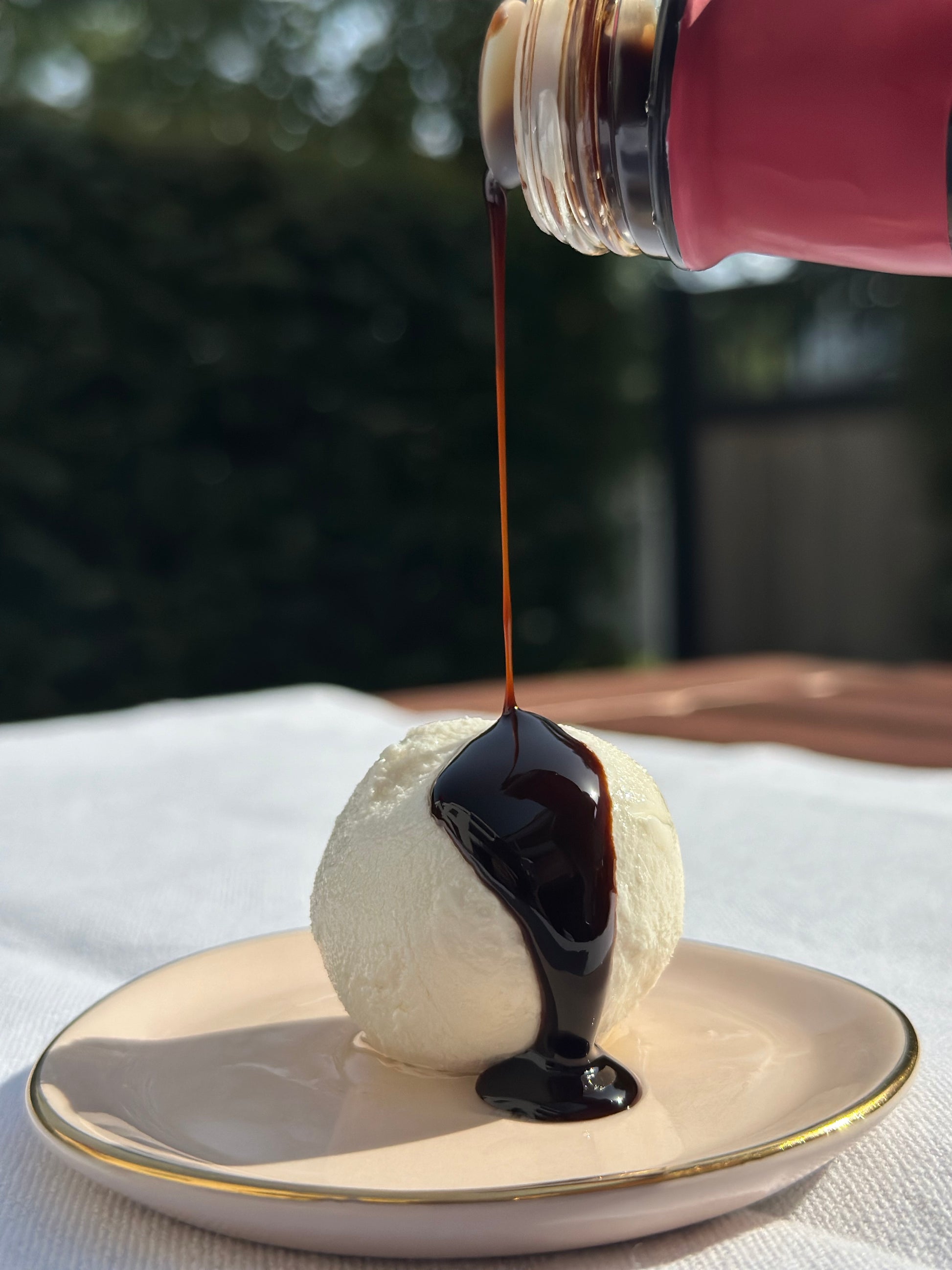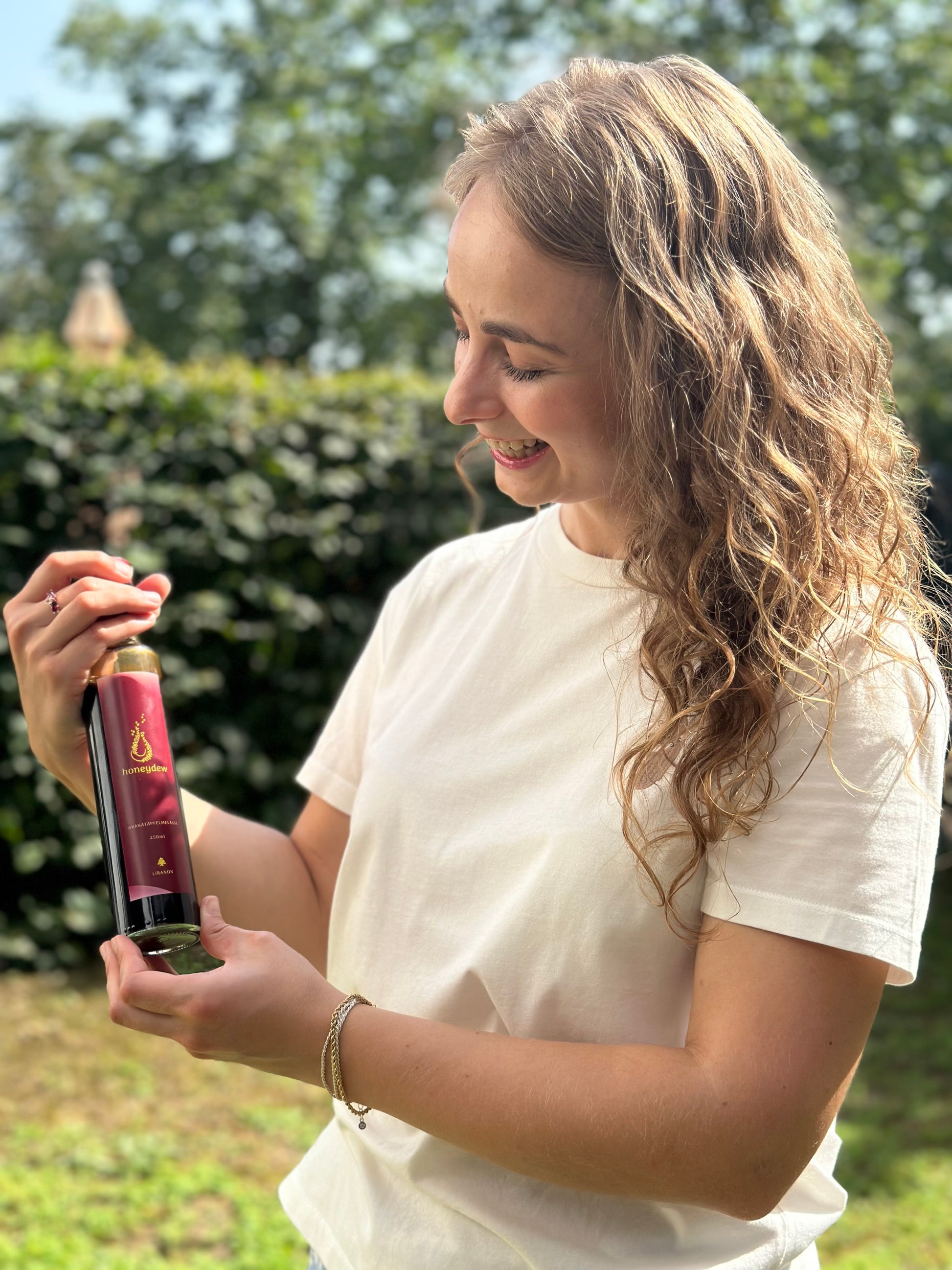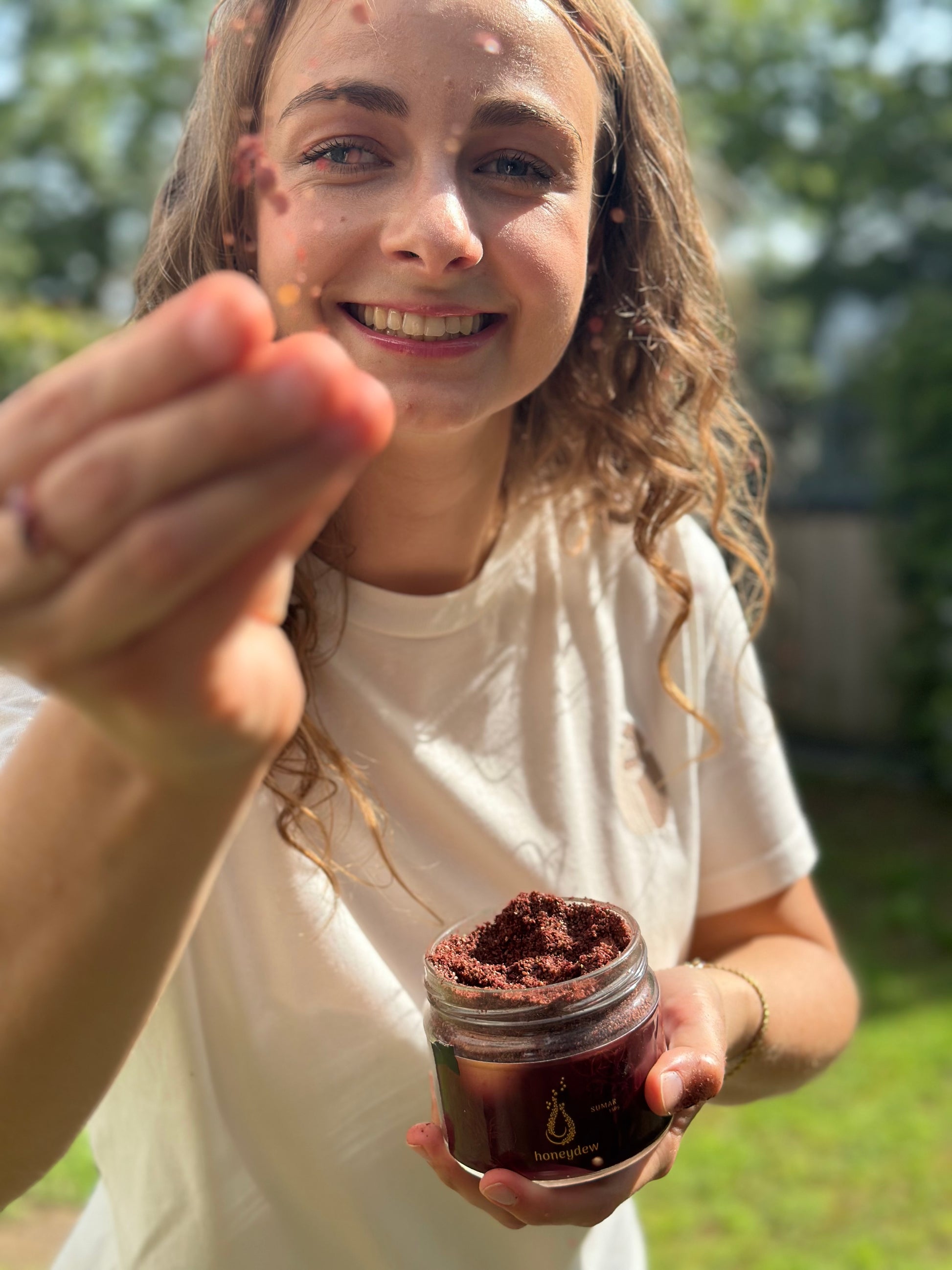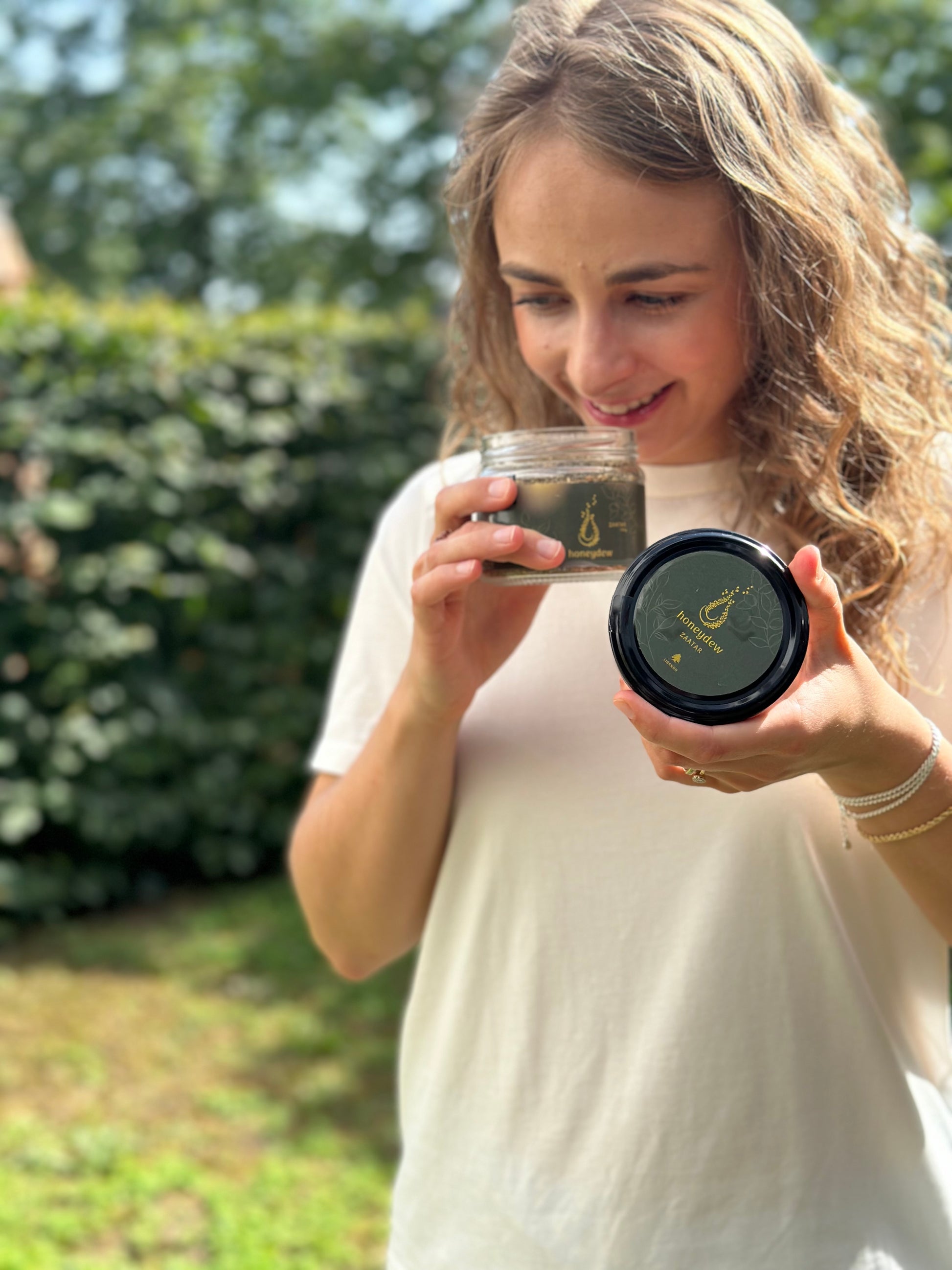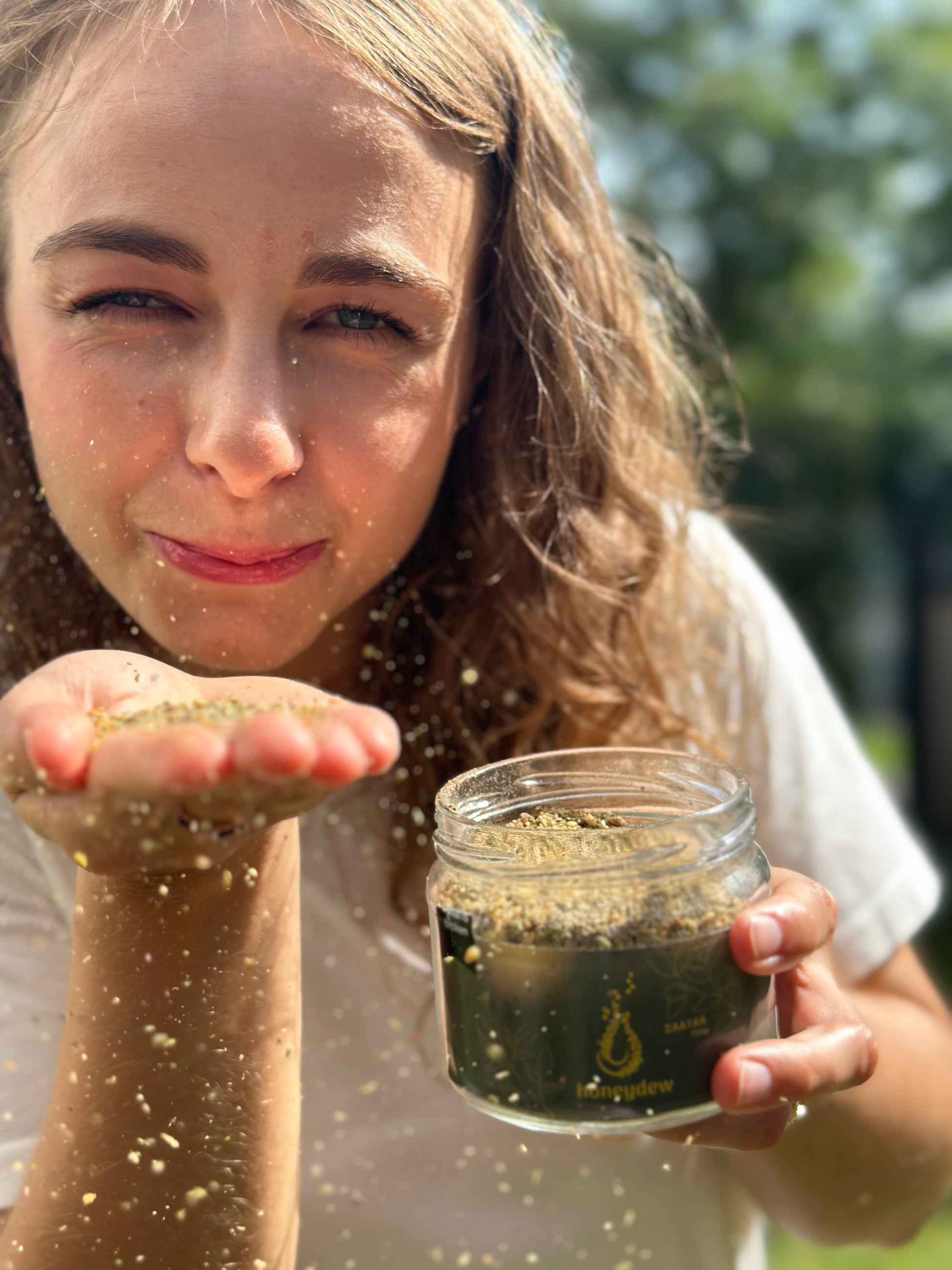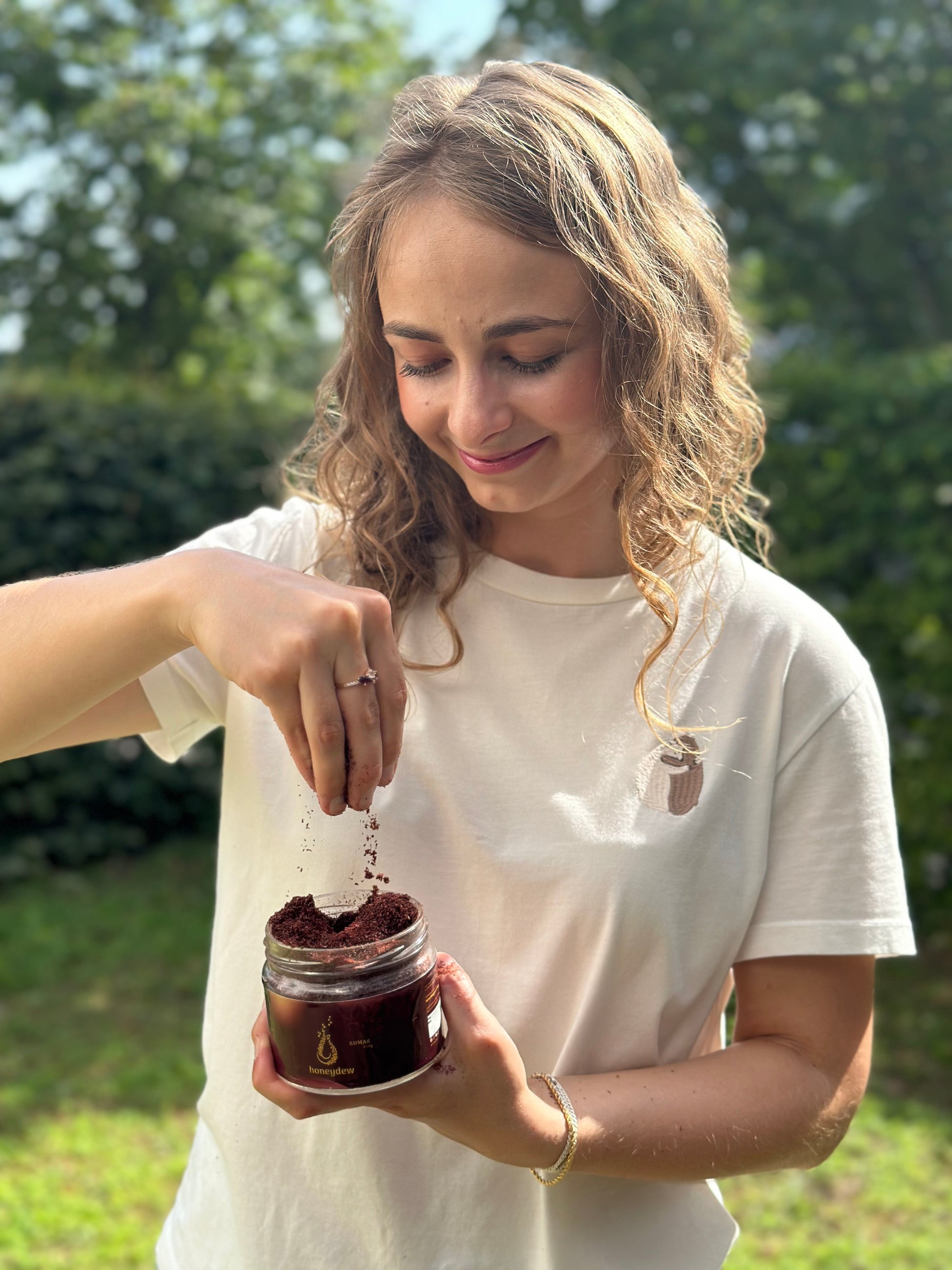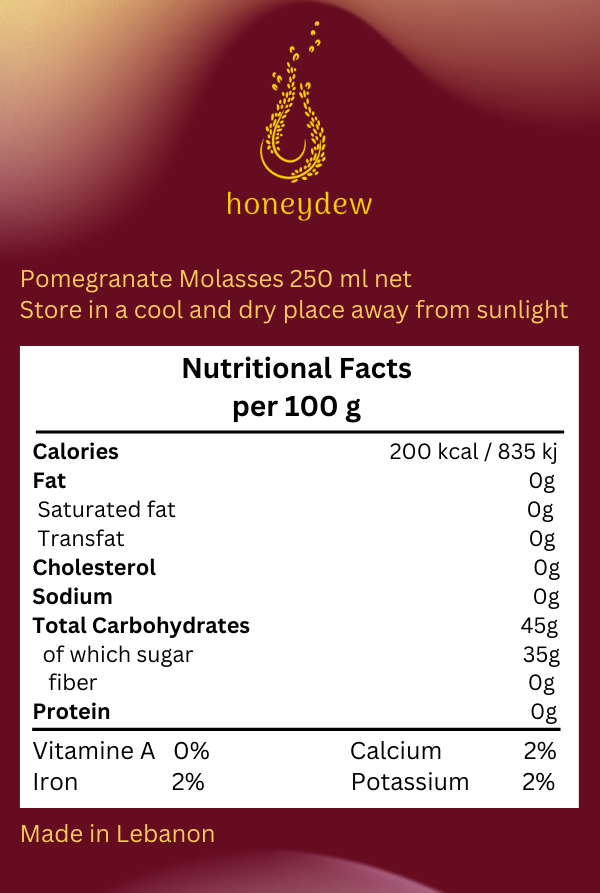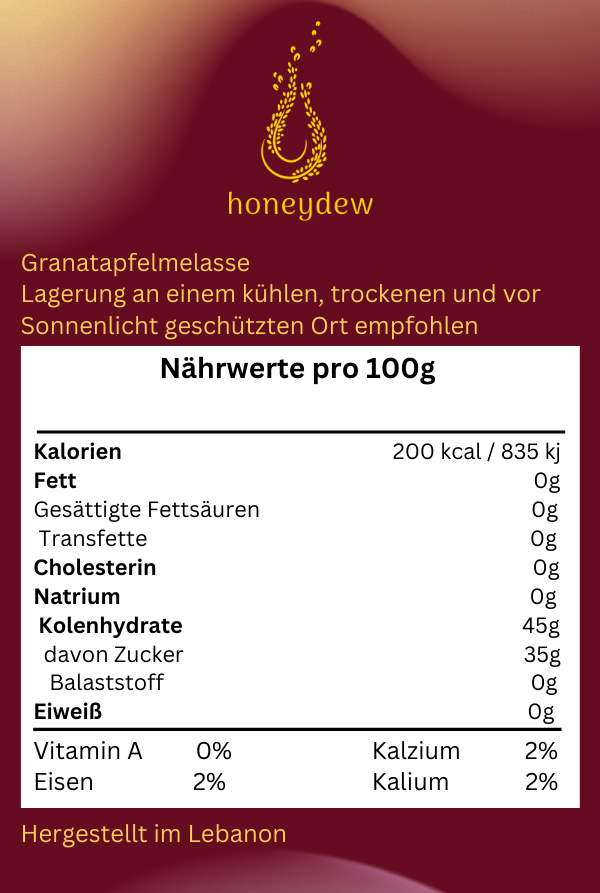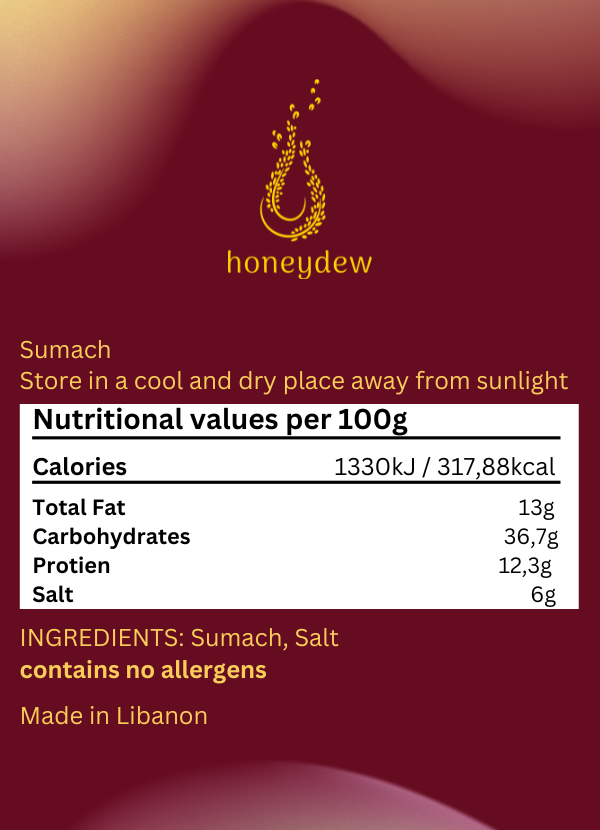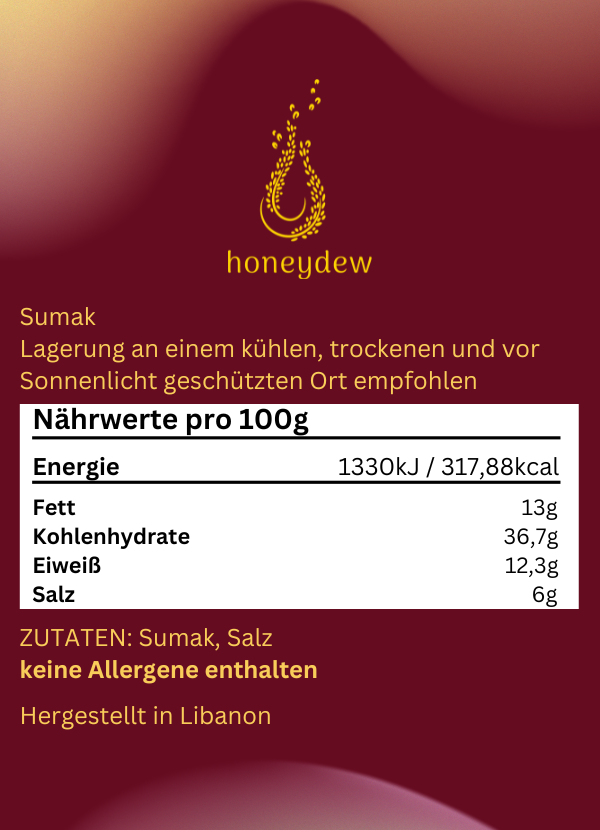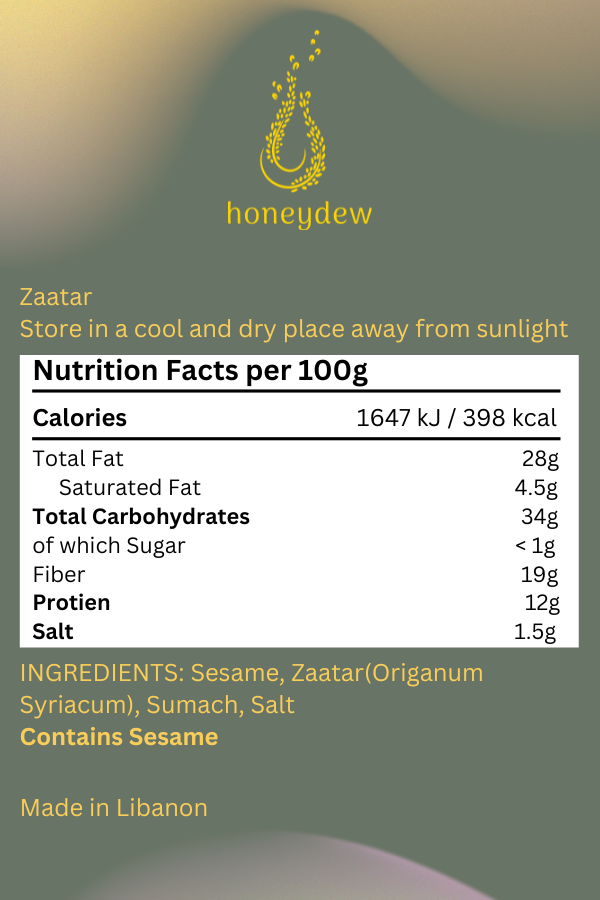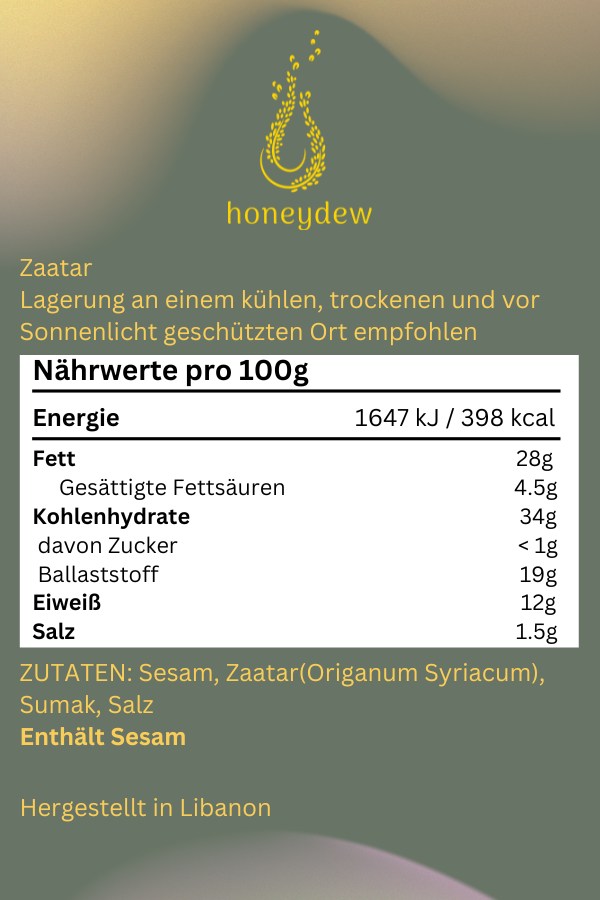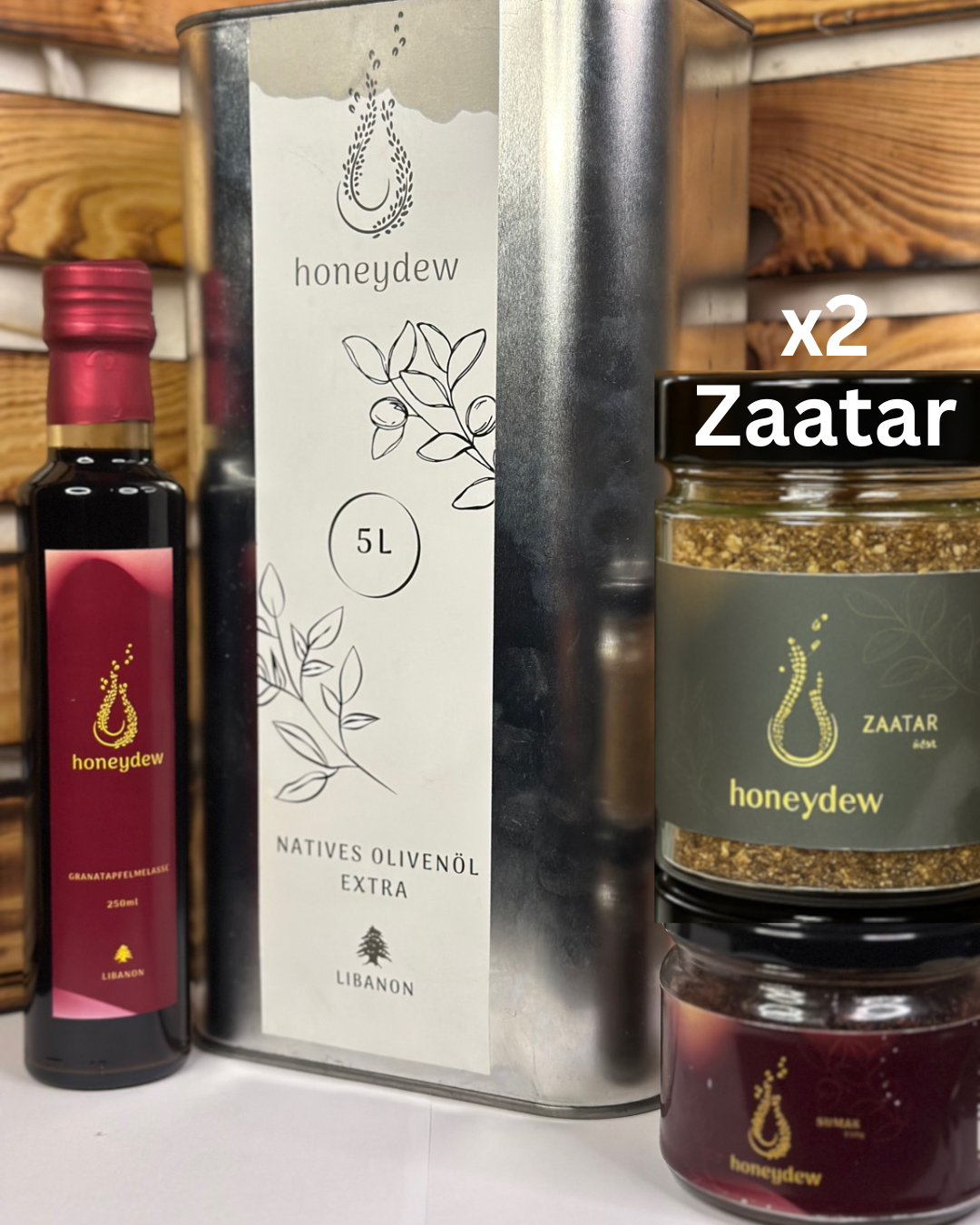Starter Set (XL+)
Product Description
(5L) Natives Olivenöl extra aus dem Libanonist bekannt für seine dunkle Farbe und seinen intensiven Geschmack, der sich in der Seele festsetzt.
Dieser intensive Geschmack kommt größtenteils von der dunkelroten Erde und der schweren, feuchten Luft, die die Olivenbäume unter der prallen Sonne mit Feuchtigkeit versorgt.
(250g) Libanesischer Zaatar! Eine Variante des Thymians, die Widerstandskraft, Ausdauer und Stärke ausstrahlt.
Nicht nur, dass die Zaatar-Pflanze das ganze Jahr über lebt, ob in der prallen Sonne oder im eisigen Wind, Zaatar schlägt seine Wurzeln überall, sogar in Felsen!
(150g) Libanesischer Sumach! Lassen Sie sich von der lebendigen Eleganz der libanesischen Sumach pflanze verzaubern! Mit seinen atemberaubenden Büscheln karminroter Steinfrüchte.
- Er wird aus den Beerenfrüchten des Rhus Coriarias-Strauchs hergestellt, der in Teilen des Mittelmeerbeckens wächst. Die Beeren werden getrocknet, dann gemahlen und gesiebt, um den bitteren inneren Kern zu entfernen.
(250ml) Erlebe die reiche Essenz des Libanon in jedem Spritzer mit unserer exquisiten libanesischen Granatapfelmelasse.
Handgefertigt nach traditionellen Methoden aus den feinsten, sonnengereiften Granatäpfeln des Mittelmeers, verleiht dieser natürliche Genuss Ihren kulinarischen Kreationen einen Hauch von spritziger Süße.
Facts
1. Unser libanesisches extra natives Olivenöl wird traditionell hergestellt und biologisch angebaut. Die Oliven werden ✅von Hand gepflückt, wenn sie den Höhepunkt ihrer Reife erreicht haben, und innerhalb weniger Stunden nach der Ernte ✅bei unter 27°C kaltgepresst, um den frischen, köstlichen Charakter unserer libanesischen Oliven zu bewahren und wertvolle Nährstoffe sowie den zarten, fruchtigen Geschmack zu erhalten. ✅Geerntet im November 2024.
😋GESCHMACK: Unser hochwertiges libanesisches extra natives Olivenöl stammt aus nachhaltig bewirtschafteten Olivenhainen und wird von Hand geerntet. Es hat eine reichhaltige, grasige Note mit einem Hauch von frischen Kräutern und einem runden, buttrigen und pfeffrigen Abgang.
💪GESUNDHEIT: Olivenöl ist ein wesentlicher Bestandteil der mediterranen Ernährung und weltweit als beliebtes Speiseöl bekannt. Unser libanesisches extra natives Olivenöl ist ✅frei von Allergenen und bietet zahlreiche Vorteile, wie einen ✅hohen Gehalt an Antioxidantien und Phenolen. Es wird ✅nicht gefiltert, um die Nährstoffe zu bewahren und hat einen niedrigen ✅ Säuregehalt (<0,3%).
2. Unser libanesisches Zaatar wird traditionell hergestellt und biologisch angebaut. Zaatar ist eine vielseitige Gewürzmischung aus wildem Thymian, geröstetem Sesam und Sumac, die in der libanesischen Küche weit verbreitet ist.
🌿 GESCHMACK: Zaatar hat einen intensiven, erdigen Geschmack mit nussigen und säuerlichen Noten. Es eignet sich hervorragend zum Würzen von Brot, Fleisch, Gemüse und als Zutat in Marinaden.
💪 GESUNDHEIT: Zaatar ist reich an Vitaminen, Mineralstoffen und Antioxidantien. Es stärkt das Immunsystem, fördert die Verdauung und hat entzündungshemmende Eigenschaften. Unser Zaatar ist frei von künstlichen Zusätzen und bietet eine gesunde, natürliche Würze für Ihre Gerichte.
🏺 TRADITIONELLER PROZESS: Die Herstellung von Zaatar umfasst das Trocknen und Mahlen von wildem Thymian, das Rösten von Sesamsamen und das Mischen mit Sumac und einer Prise Salz. Diese Mischung wird gründlich vermengt, um eine gleichmäßige Verteilung der Aromen zu gewährleisten. Traditionell bereiteten Familien Zaatar in großen Mengen zu und lagerten es für den ganzjährigen Gebrauch, um die lebendigen Aromen des Nahen Ostens zu bewahren.
🌿 PFLANZENFAKTEN UND GESCHICHTE: Der wilde Thymian, der in Zaatar verwendet wird, bekannt als Origanum syriacum, wächst reichlich in den Bergregionen des Libanon. Historisch gesehen ist Zaatar seit Jahrhunderten ein Grundnahrungsmittel in der nahöstlichen Ernährung und wird oft mit Stärke und Wachsamkeit in Verbindung gebracht. Die Kombination aus Kräutern und Gewürzen bietet nicht nur einen reichen Geschmack, sondern auch eine Verbindung zu den alten kulinarischen Traditionen der Region.
3. Unsere libanesische Granatapfelmelasse wird traditionell hergestellt und biologisch angebaut, ohne Zusatz von Zucker. Diese Melasse ist ein Konzentrat aus Granatapfel und ein Grundbestandteil der libanesischen Küche.
🌿 GESCHMACK: Die Granatapfelmelasse hat einen tiefen, süß-säuerlichen Geschmack, der Salaten, Saucen und Fleischgerichten eine besondere Note verleiht. Sie ist vielseitig einsetzbar und verleiht Gerichten eine exotische, fruchtige Tiefe.
💪 GESUNDHEIT: Granatapfelmelasse ist reich an Antioxidantien, Vitaminen und Mineralstoffen. Er unterstützt die Herzgesundheit, verbessert die Verdauung und hat entzündungshemmende Eigenschaften. Unsere Melasse enthält keinen zugesetzten Zucker, was ihn zu einer gesunden Wahl für Ihre Küche macht.
🏺 TRADITIONELLER PROZESS: Die Herstellung von Granatapfelmelasse umfasst das Entsaften frischer Granatäpfel und das langsame Reduzieren des Saftes bei niedriger Hitze, bis er sich zu einer Melasse verdickt. Diese traditionelle Methode bewahrt die natürlichen Aromen und Nährstoffe der Frucht. Im Libanon ist Granatapfelmelasse eine geschätzte Zutat, die oft während der Granatapfelerntezeit zubereitet wird.
🌿 PFLANZENFAKTEN UND GESCHICHTE: Der Granatapfelbaum, Punica granatum, ist im Nahen Osten beheimatet und wird seit Tausenden von Jahren kultiviert. Als Symbol für Fruchtbarkeit und Überfluss haben Granatäpfel eine reiche Geschichte in der nahöstlichen Kultur und Küche. Die leuchtenden Samen der Frucht sind nicht nur köstlich, sondern auch voller Nährstoffe, die sie zu einer wertvollen Ergänzung der Ernährung machen.
🌍 FAIR TRADE: Wir setzen uns für fairen Handel ein, indem wir direkte Partnerschaften mit lokalen Bauern eingehen. Jeder Kauf unseres Sumac unterstützt die faire Bezahlung und nachhaltige Lebensgrundlagen der Bauern und trägt zur Förderung gerechter Handelspraktiken bei.
🏺 TRADITION: Bei Honeydew arbeiten wir eng mit lokalen Bauern zusammen, die nach traditionellen Methoden arbeiten, die von Generation zu Generation weitergegeben wurden. Jeder Kauf unterstützt direkt diese Kleinbauern und ihre Gemeinden, indem wir ihnen einen Markt bieten, um ihre hochwertigen Produkte weltweit bekannt zu machen.
Nutritional Facts
Please See Pictures 😊
Notice
This year’s batch was harvested and packaged during a time when Lebanon was at conflict. Despite the challenges, we managed to pull through. However, we were unable to secure our usual canisters with the thickness and durability we prefer.
We pack every order with great care, but since DHL isn’t always the gentlest during shipping, your canister may arrive with some dents. Rest assured, it’s always fully usable and contains the same high-quality olive oil you know and love.
Transparency means a lot to us, and we truly appreciate your support — especially as a small family business with a big mission.
Warm regards,
Hassan & Claudia
- FAQ
- Sustainable
- Free Shipping
Couldn't load pickup availability
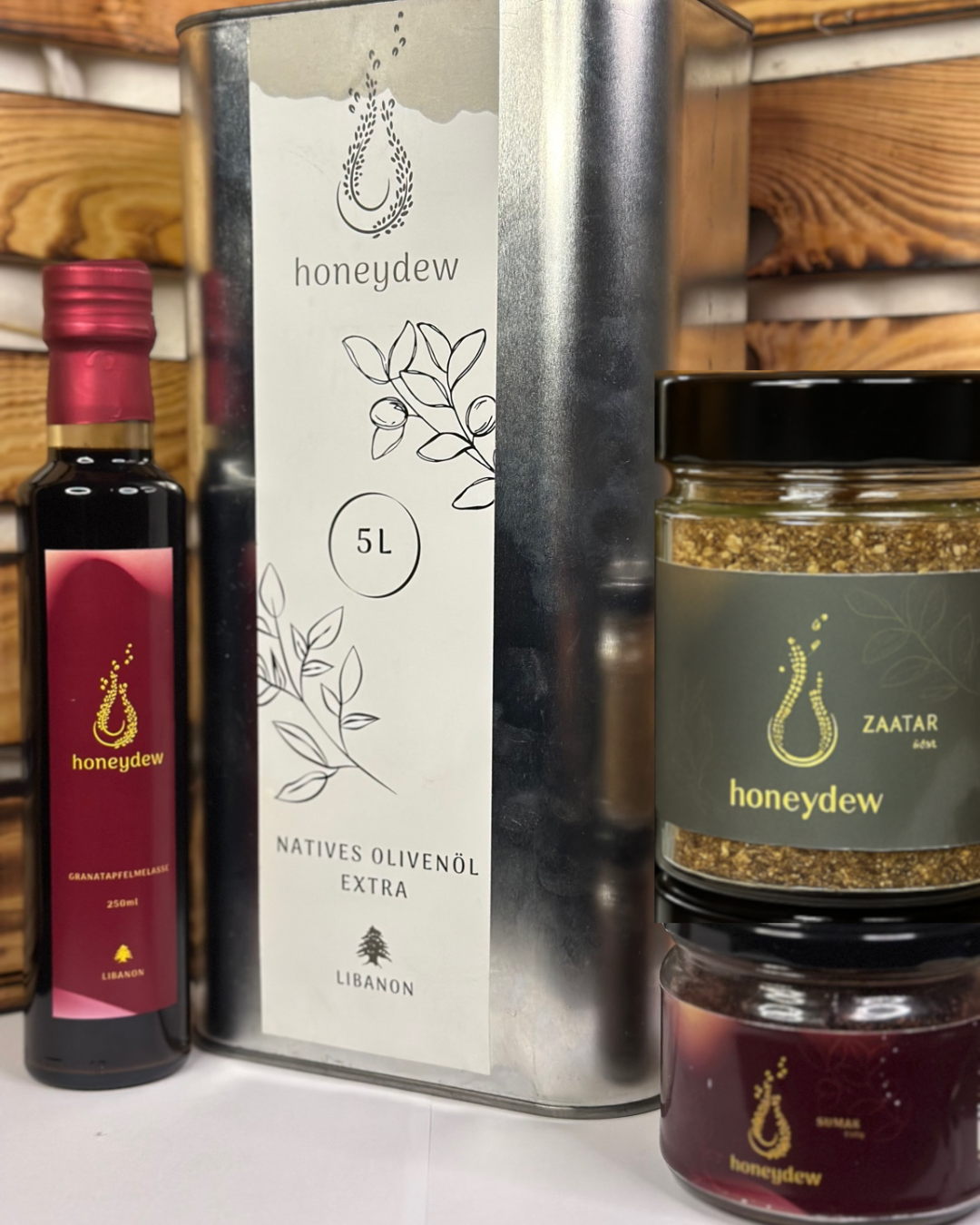
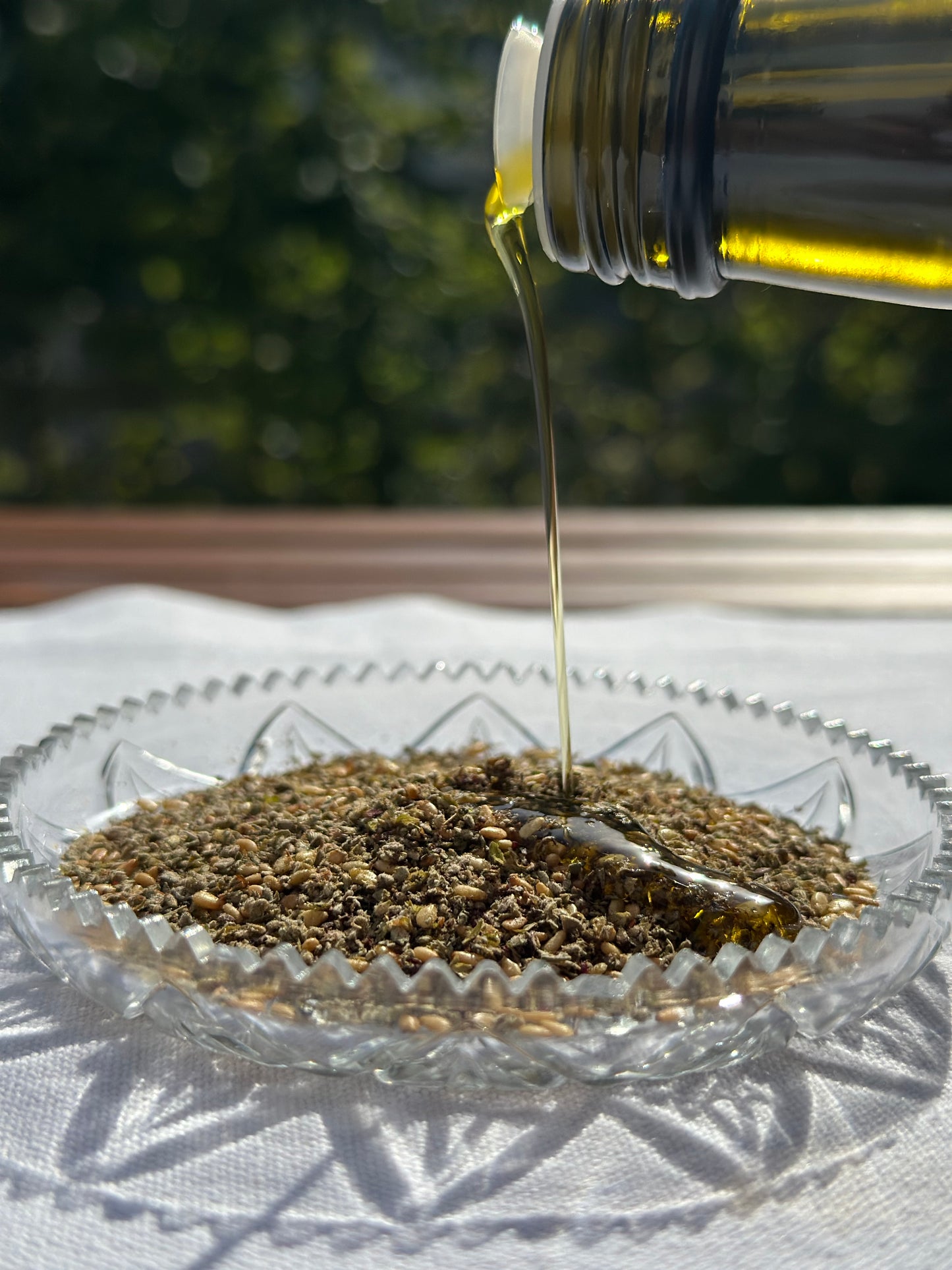
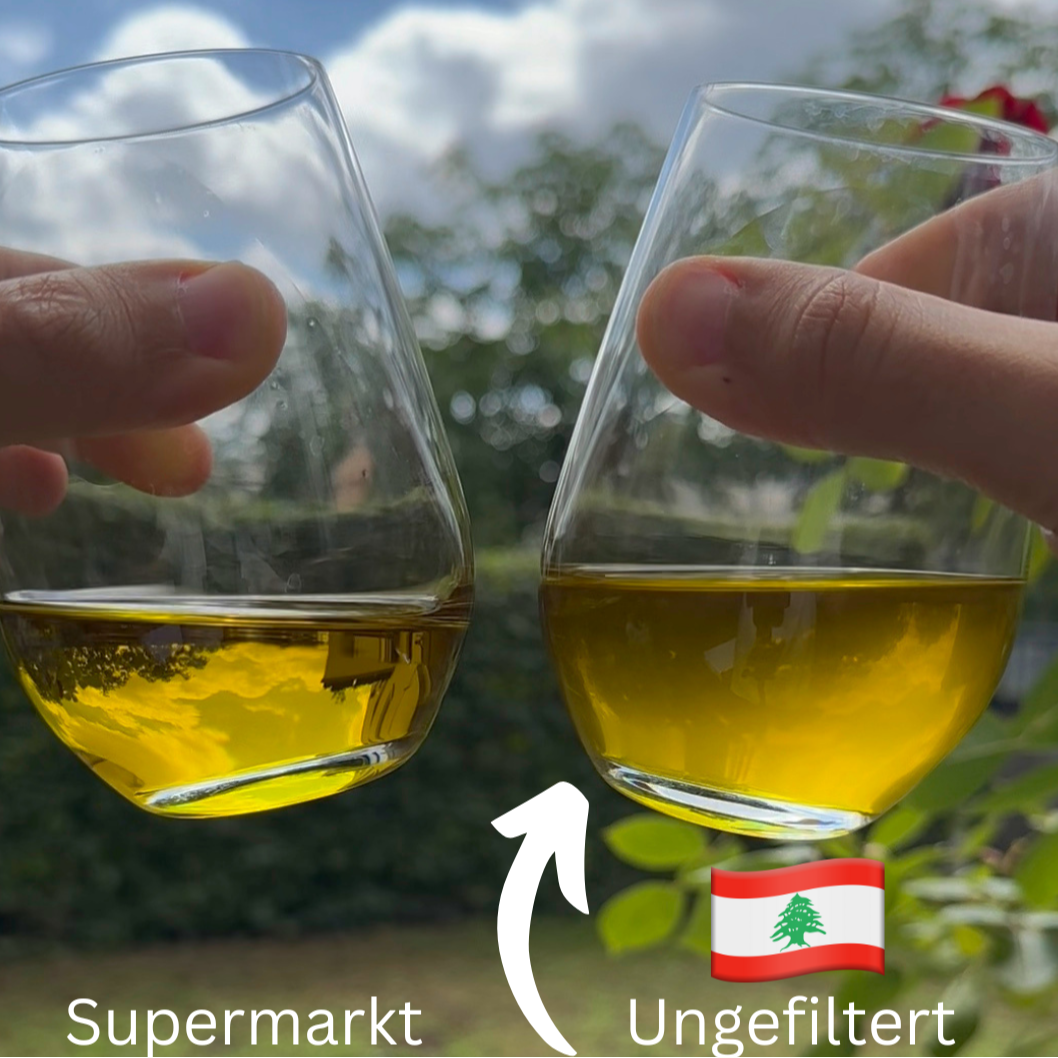
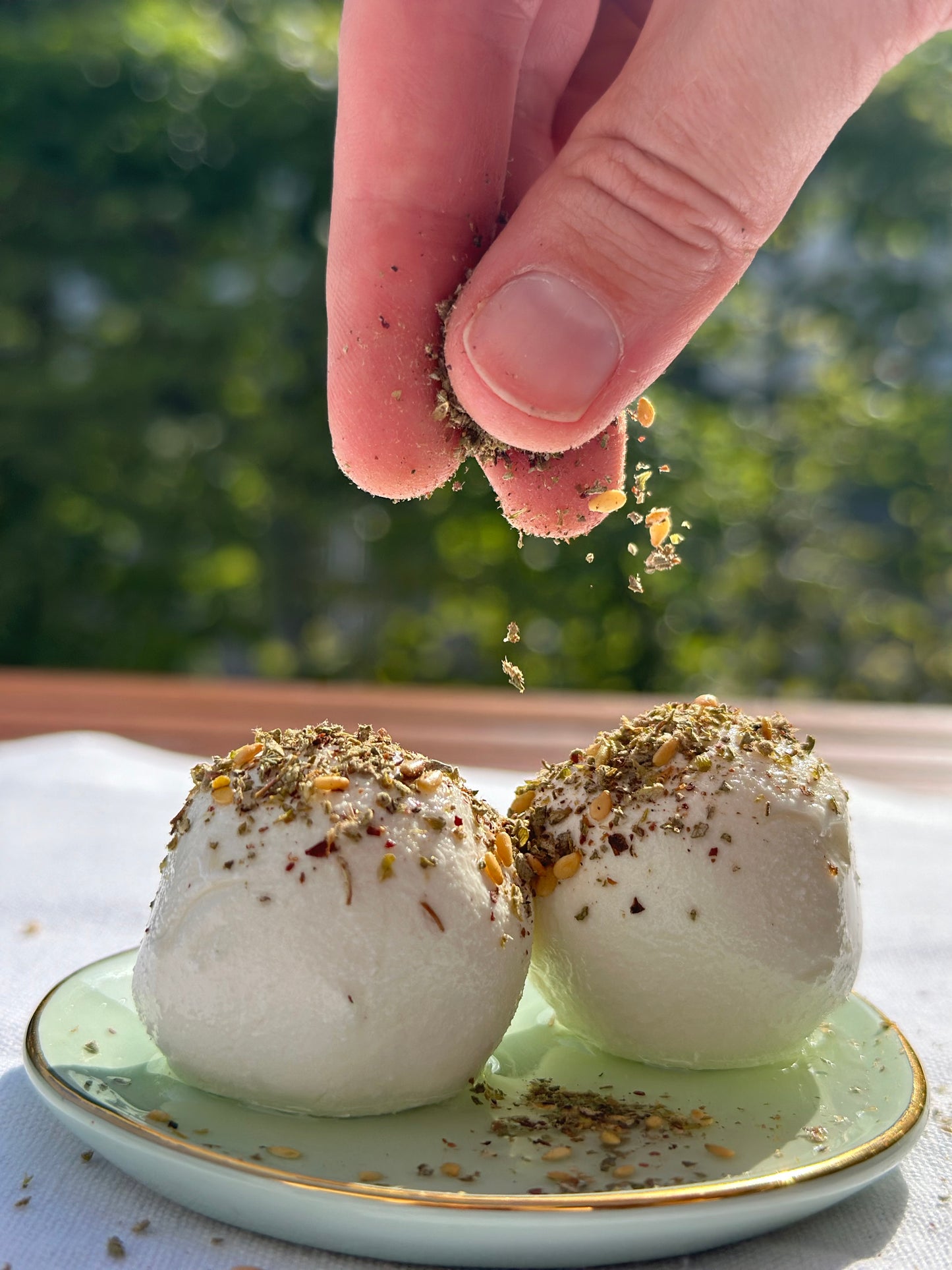
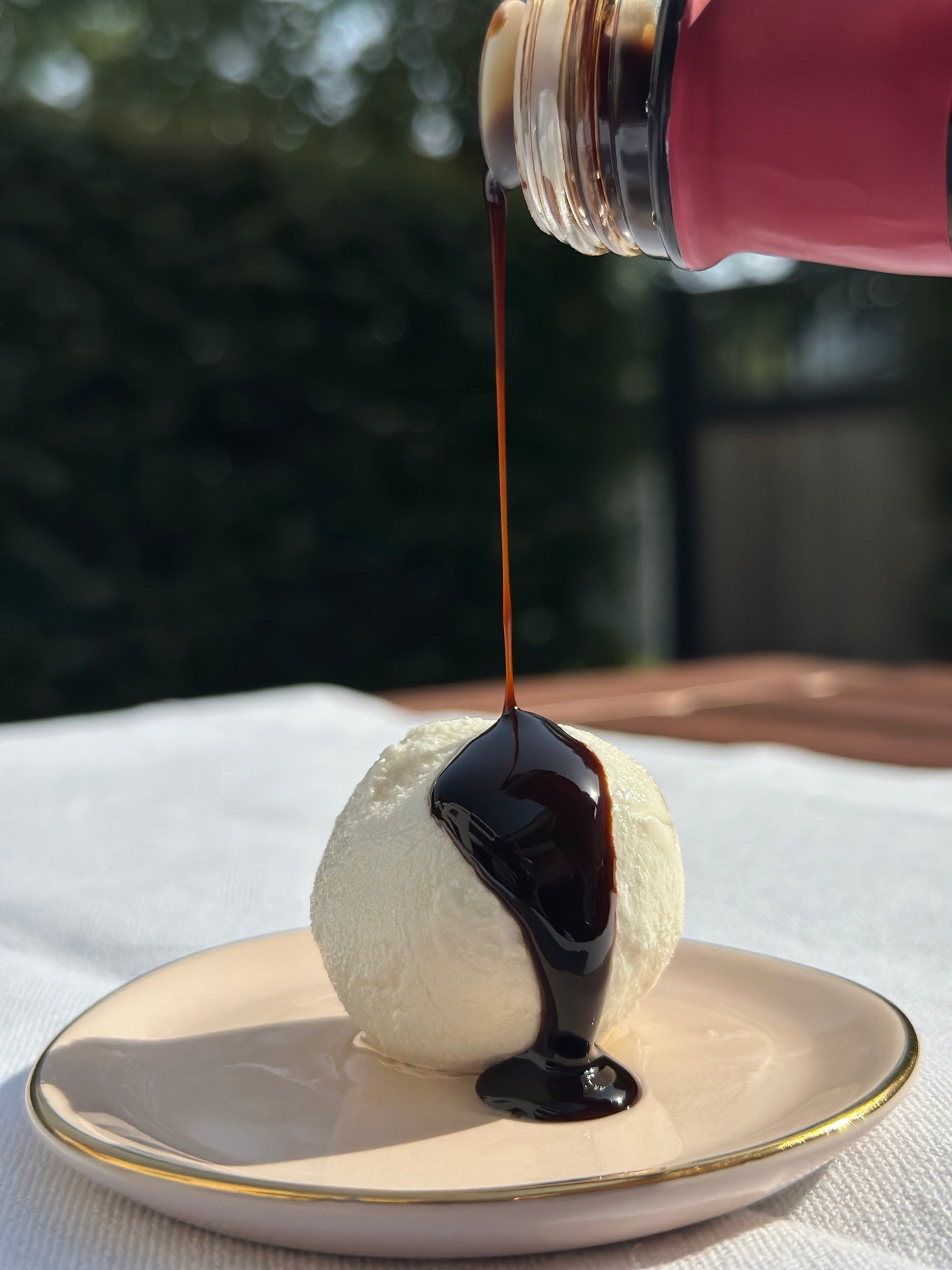
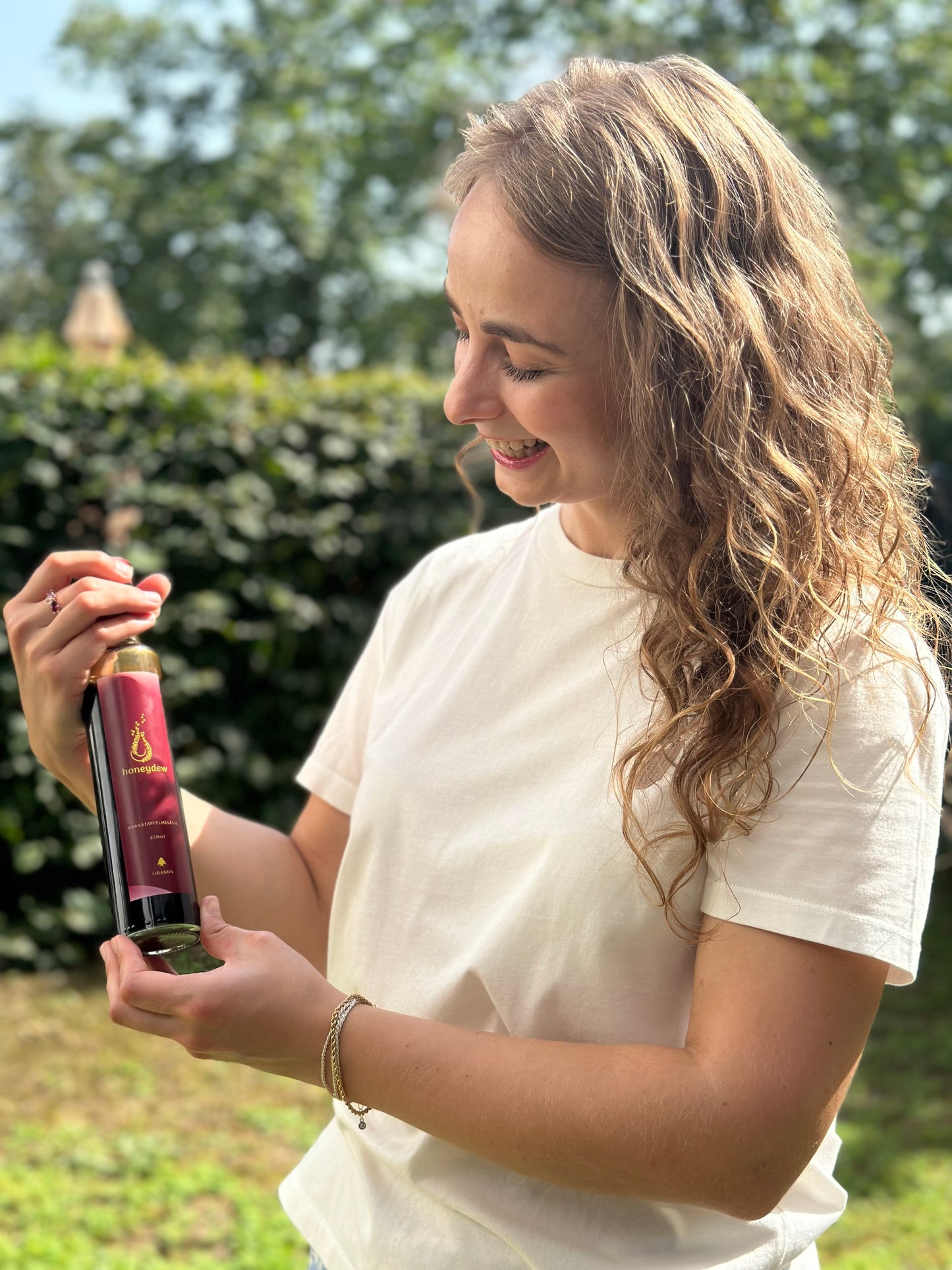
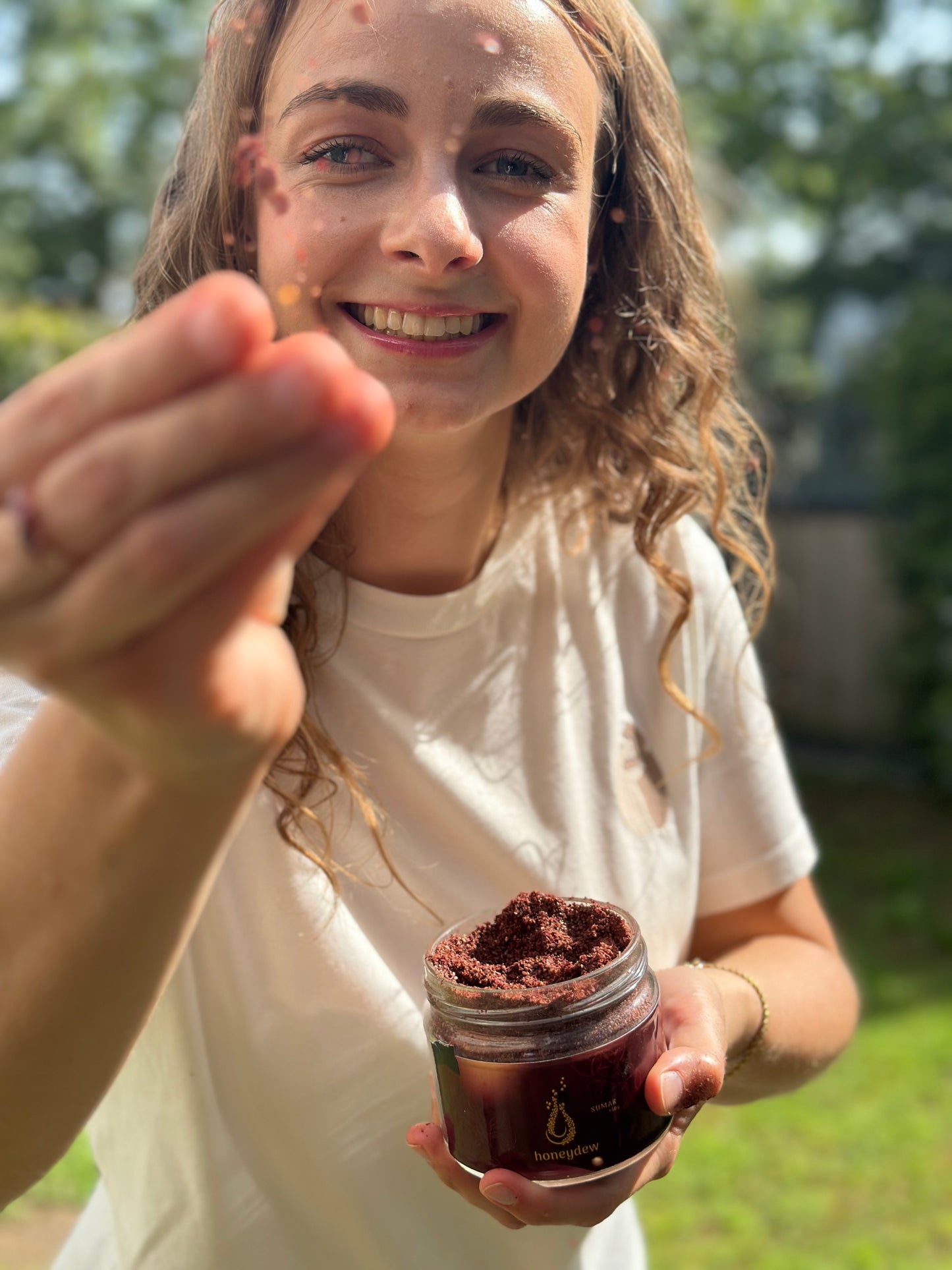
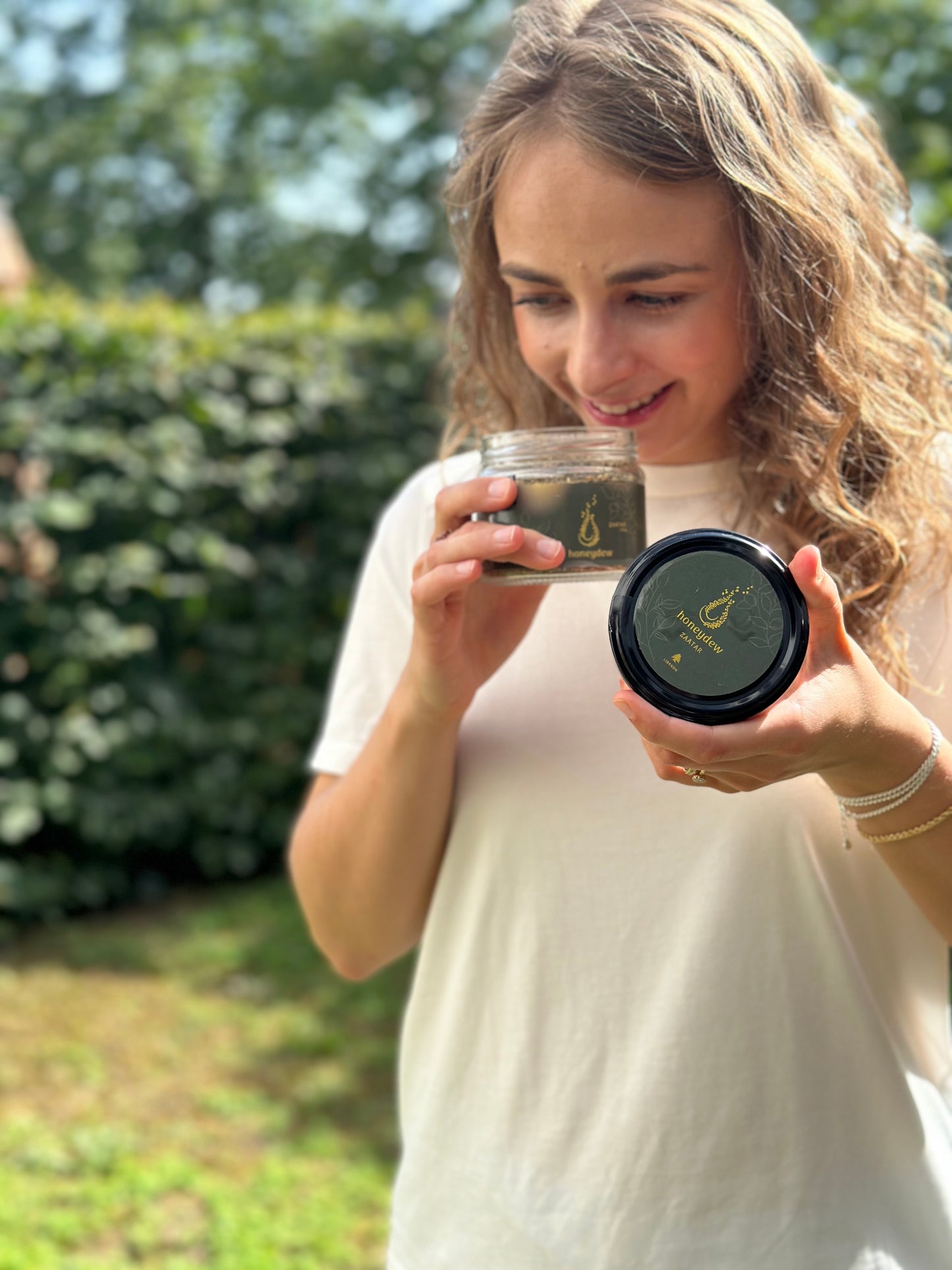
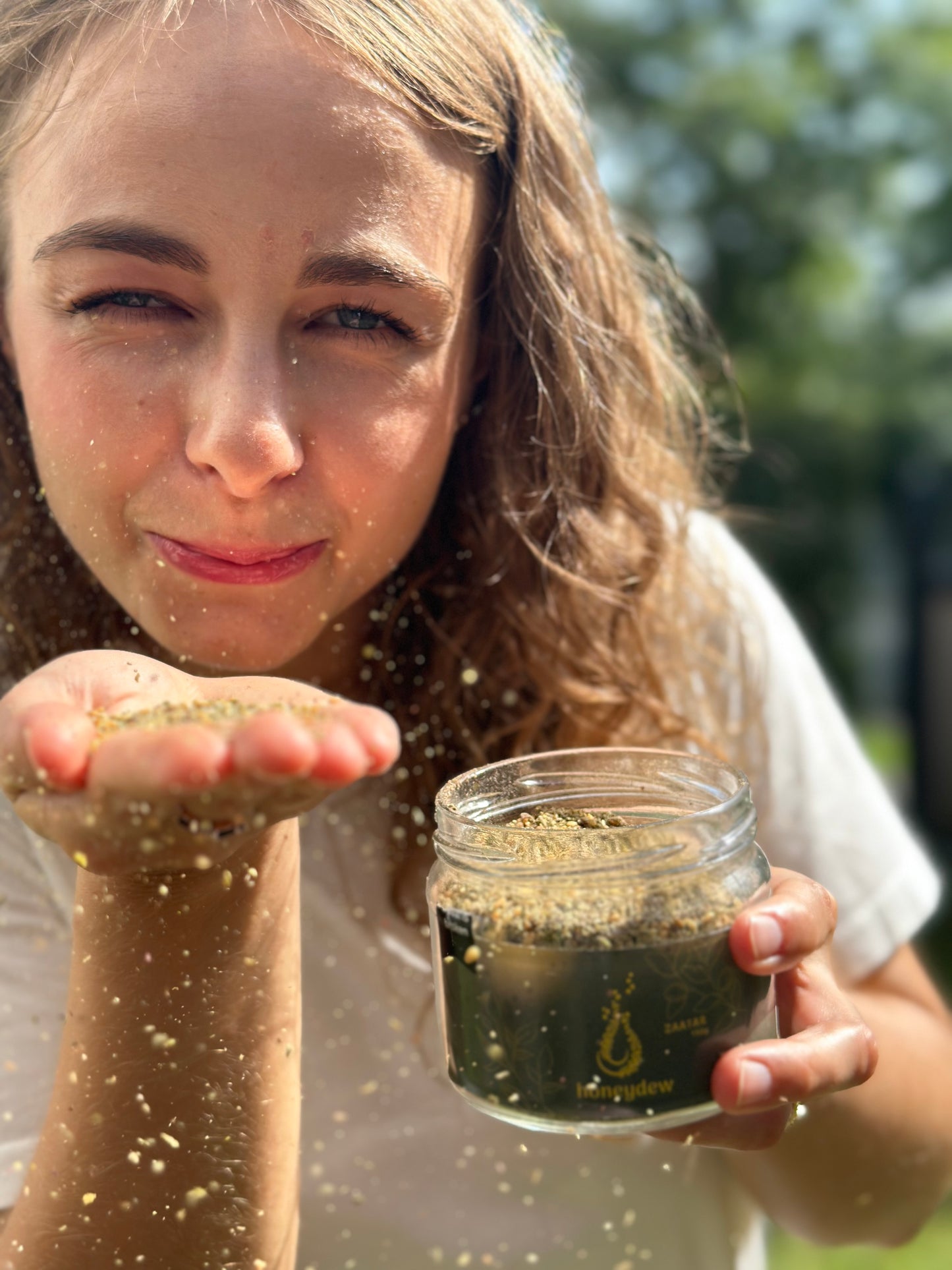
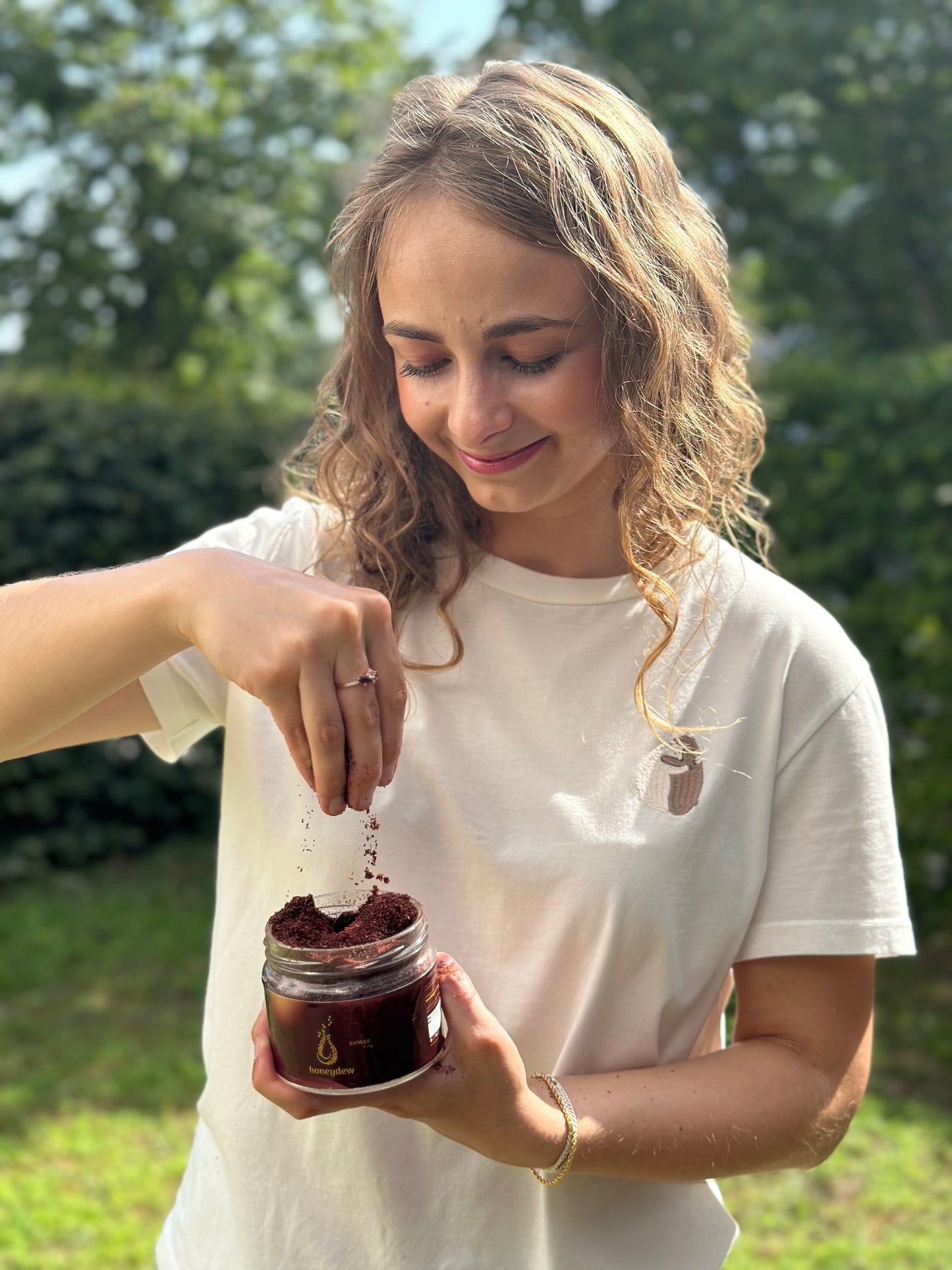



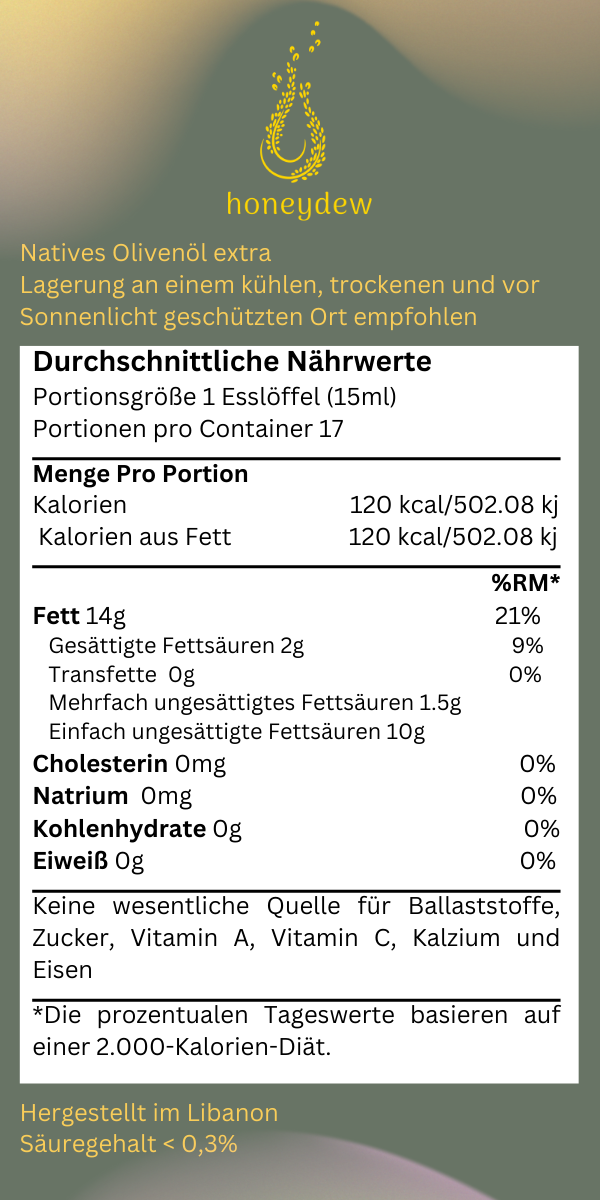
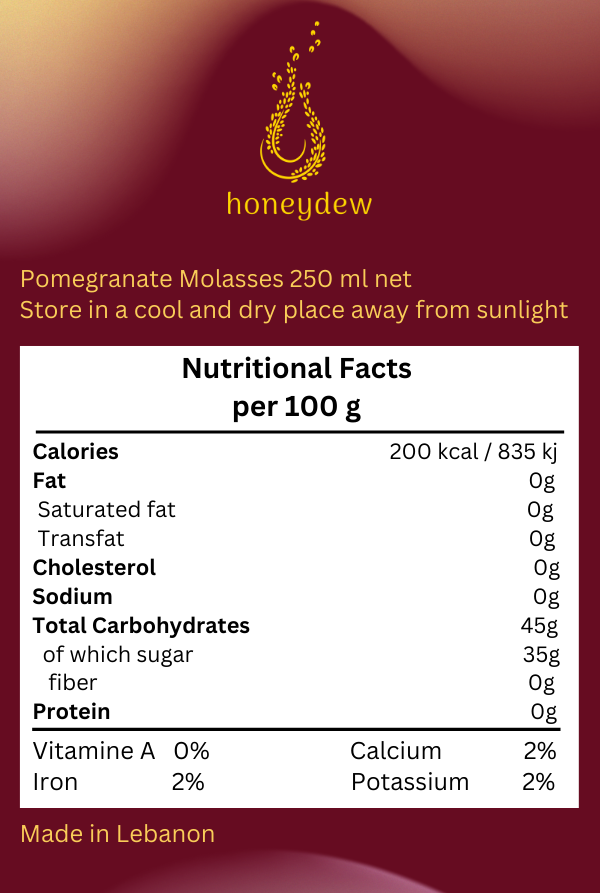
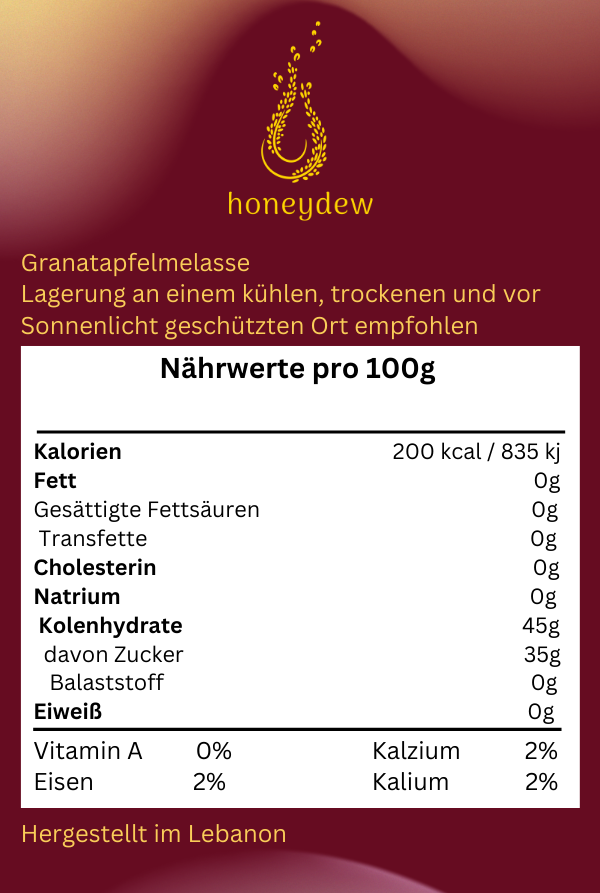
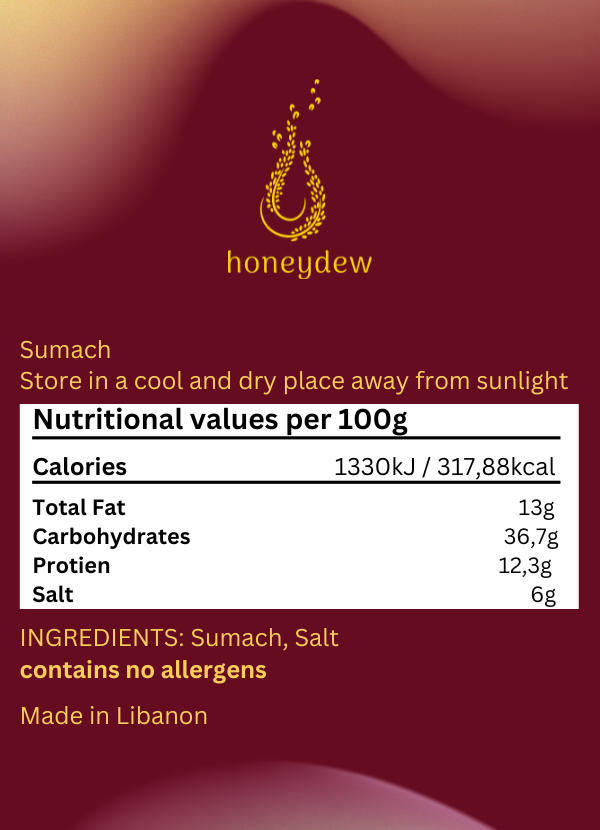
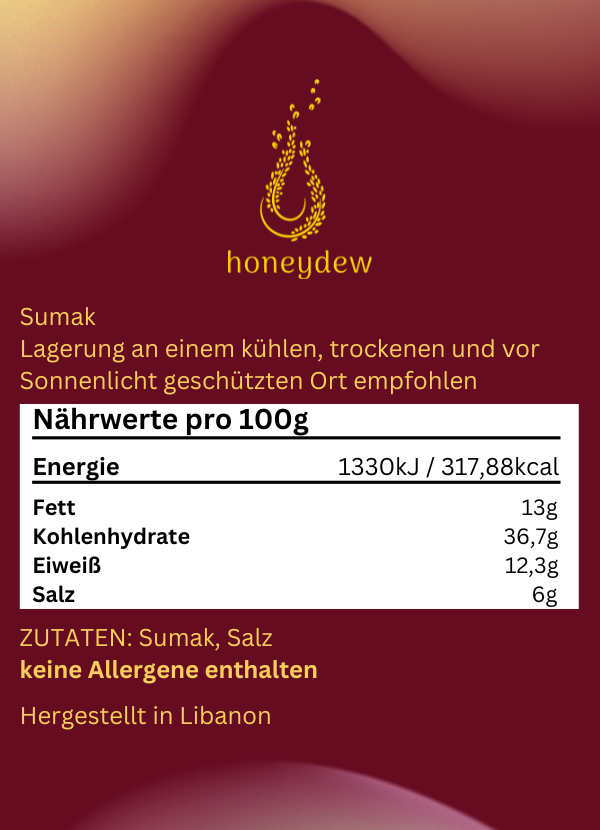
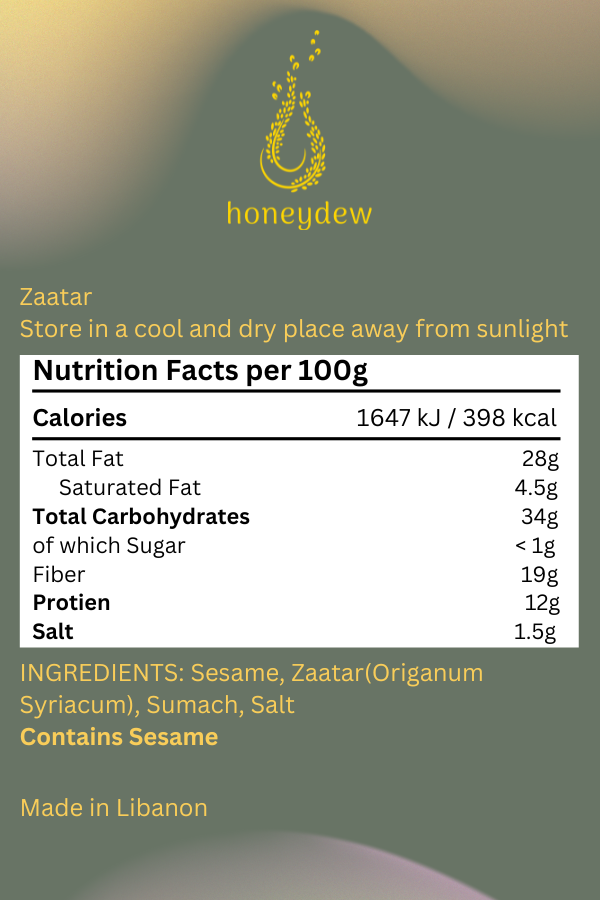
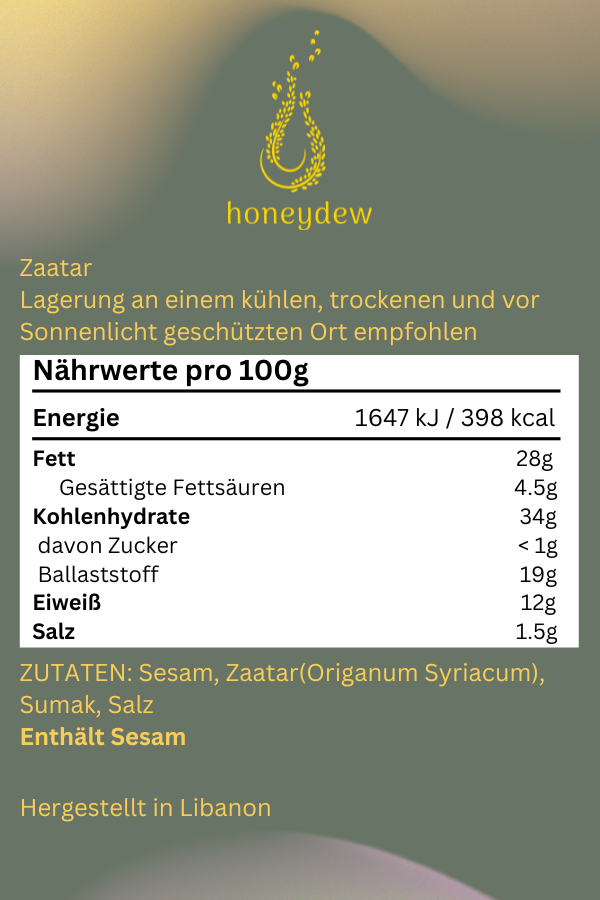
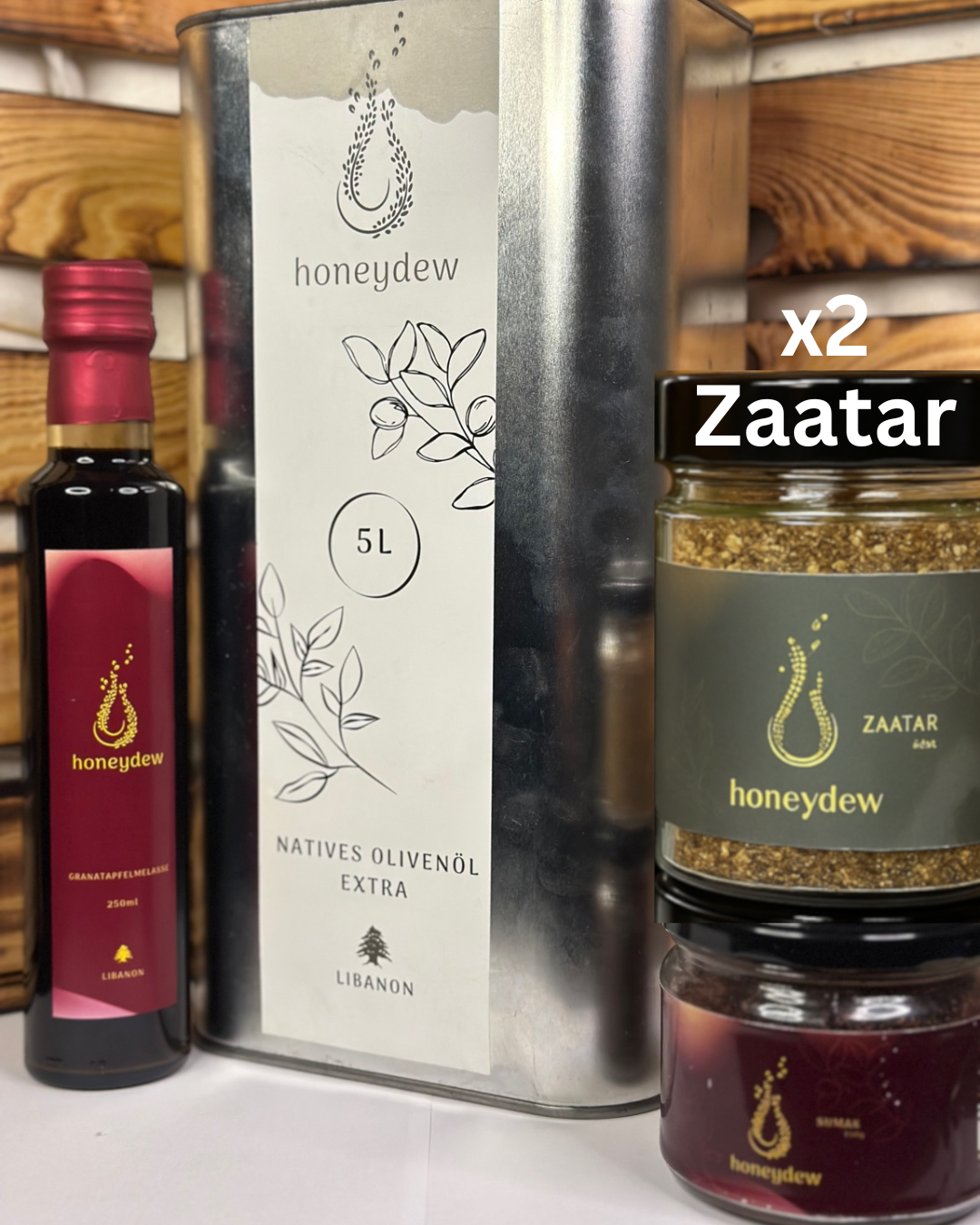

Origin
Between Lebanon's Mountains and the Mediterranean
Honeydew olive oil originates from Batroun, a picturesque coastal region in northern Lebanon. Here, between the Mediterranean Sea and rolling hills, olive trees have thrived for centuries in fertile, limestone-rich soil.
The Mediterranean climate, with its warm summers and gentle sea breeze, enhances the fruit’s rich aroma and exceptional quality. Each harvest reflects the deep-rooted tradition and unique terroir of Batroun – making Honeydew Olive Oil a truly unparalleled taste experience.
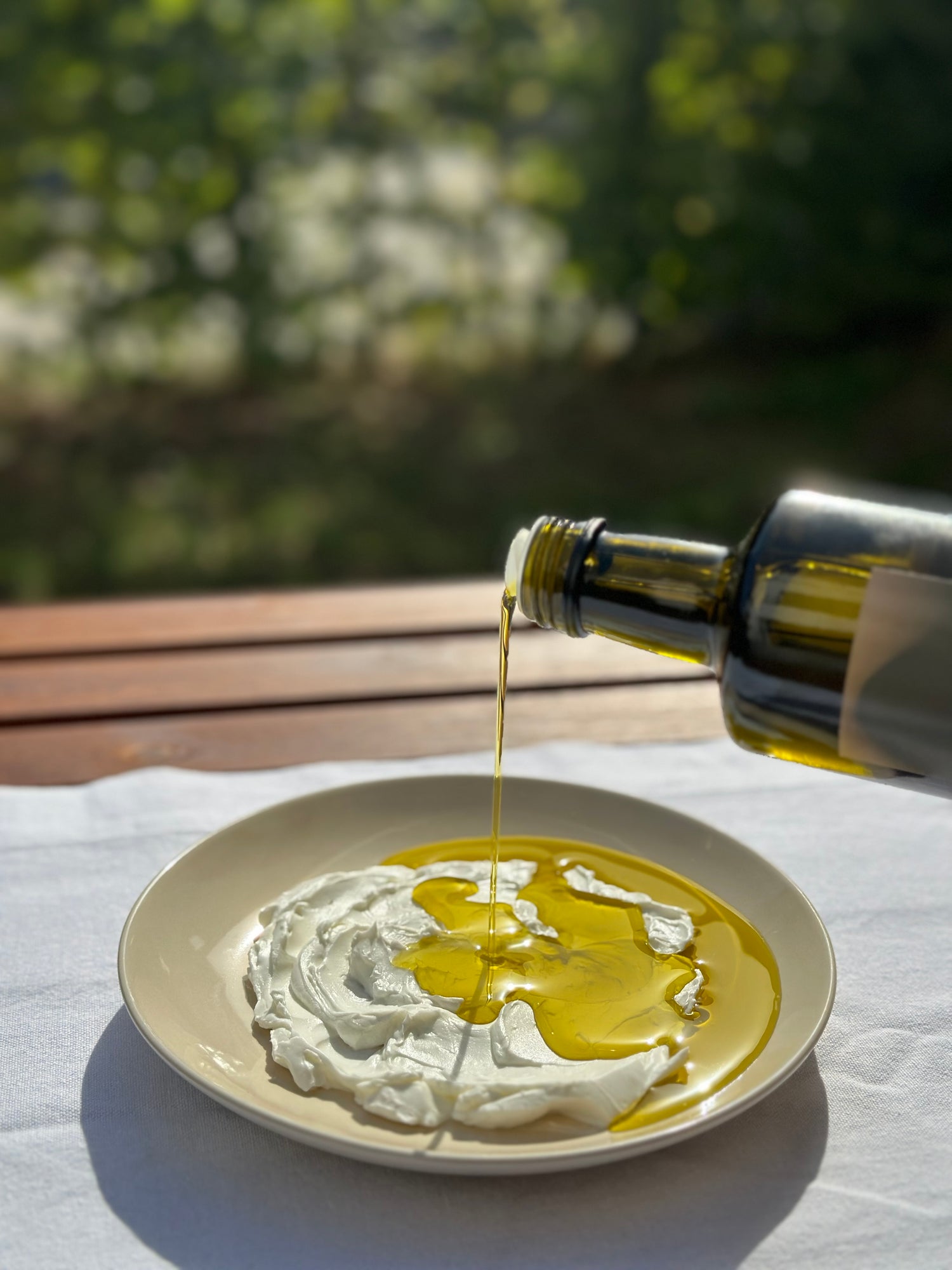
Taste
Taste Profile
Honeydew Olive Oil unveils a complex bouquet of flavors, capturing the essence of Lebanese olive groves in every drop.
The first impression is delightfully fruity, with hints of green tomatoes and freshly cut grass. On the palate, a delicate bitterness reminiscent of tender artichokes unfolds, perfectly balanced with a subtle spiciness. The finish is smooth yet full of character – a harmonious interplay of nutty notes and a gentle peppery kick that highlights the purity and freshness of this exceptional oil.
Honeydew Olive Oil is more than just a delight – it is a true taste experience.
Customer Testimonials
Tippe auf ein Video für Ton
When are Olives harvested?
In Lebanon, olives are typically harvested between October and December. The exact timing depends on the variety and the desired ripeness of the olives. For high-quality extra virgin olive oil, the fruits are usually harvested early, while still green or slightly violet, to ensure an intense aroma and high nutrient content.
At Honeydew, November is the ideal time to harvest our olives to guarantee their full, rich flavor
What does cold-pressed olive oil actually mean?
"Cold press" refers to a method of extracting oil from olives without using high heat or chemicals. The olives are crushed, and the oil is extracted mechanically at a temperature below 27°C (80°F). This process helps preserve the natural flavors, nutrients, and antioxidants, resulting in high-quality olive oil, often labeled as extra virgin.
For olive oil, "cold pressed" and "extra virgin" hold the same meaning. If you see "extra virgin olive oil" on the label, it means the oil is cold pressed.
What is the difference between olive oil and extra virgin olive oil?
The difference between "olive oil" and "extra virgin olive oil" lies in their production process, quality, and taste:
Olive Oil
- Type: Refined or pure olive oil.
- Production: Typically a blend of refined olive oil (processed with heat or chemicals to remove impurities) and a small amount of virgin olive oil for flavor.
- Flavor: Neutral taste, less fruity or aromatic.
- Smoke Point: Higher, making it suitable for high-heat cooking.
- Nutrients: Contains fewer natural antioxidants and nutrients due to refining.
Extra Virgin Olive Oil
- Type: The highest quality olive oil.
- Production: Cold-pressed from fresh olives without the use of heat or chemicals.
- Flavor: Rich, fruity, and aromatic with a slight peppery finish.
- Smoke Point: Lower, better for drizzling, salads, or low-heat cooking.
- Nutrients: Packed with antioxidants, polyphenols, and healthy fats.
In short, extra virgin olive oil is unrefined and retains its natural flavors and health benefits, whereas regular olive oil is refined and better suited for cooking.
At what temperatures are they suitable for heating and frying?
Here are the approximate smoke points of different olive oils, which are essential for determining the right temperature for frying and heating:
Extra Virgin Olive Oil (like honeydew)
- Smoke Point: ~190°C (375°F)
- Best For: Frying at low to medium heat, drizzling, dressings, and dips.
Virgin Olive Oil
Smoke Point: ~210°C (410°F)
Best For: Frying at medium heat, sautéing, and light heating.
Pure/Refined Olive Oil
- Smoke Point: ~240°C (465°F)
- Best For: Frying at high heat, deep frying, roasting, and grilling.
General Cooking Temperature Guidelines:
- Sautéing: ~120–180°C (250–350°F)
- Frying: ~175–190°C (350–375°F)
- Baking: ~180–200°C (350–400°F)
Always keep the smoke point of the oil in mind to avoid burning and to preserve flavor and nutrients when heating or frying.
What is the significance of olive oil acidity and how is it tested?
At honeydew we have been maintaining an acidity level of < 0.3% for years!
But what does that actually mean?
The acidity level of olive oil is a critical measure of its quality and freshness. Here's its significance and how it is tested:
Significance of Olive Oil Acidity
- Quality Indicator: Acidity reflects the amount of free fatty acids present, which indicates how much the oil has degraded. Lower acidity levels mean higher-quality oil.
- Extra Virgin Olive Oil: Must have an acidity of less than 0.8%.
- Virgin Olive Oil: Acidity ranges between 0.8% and 2%.
- Taste and Flavor: High acidity can lead to a rancid or unpleasant taste, while low acidity contributes to a smoother, fresher flavor.
- Freshness: Acidity increases when olives are damaged, overripe, or processed poorly, signaling a lack of freshness.
- Health Benefits: Lower acidity oils often retain more antioxidants and beneficial compounds.
How is Acidity Tested?
- Chemical Analysis: Acidity is measured in a laboratory using a process called titration, which determines the percentage of free fatty acids (oleic acid) in the oil.
** Sensory Testing gives no indication of the acidity.
**Label Verification: Acidity should typically be listed on the product label for high-quality olive oils, especially extra virgin.
What should I consider when choosing a high-quality olive oil?
When selecting high-quality olive oil, you should focus on taste and quality.
- Taste: Olive oil generally falls into two main categories:
- Quality: The most critical aspect is ensuring the oil is pure and has a low acidity level (<0.8%). Low acidity indicates that the oil was produced from fresh olives and with a clean process, qualifying it as "cold-pressed extra virgin." However, not all olive oils labeled "Extra Virgin" or "Bio" meet these standards. Many brands lack transparency, particularly about acidity levels or pesticide residues.
Even within Europe, regulations and audits for these labels can be inconsistent.
To ensure you’re getting the best, look for:
- Transparent brands: Those that provide test results showing low acidity and minimal pesticide levels.
- Non-EU sources: Olive oils from countries like Lebanon often undergo stricter testing before being imported to Europe.
For example we at honeydew, offer family-made olive oil sourced from Lebanon with an acidity of <0.3% (extremely rare). Their production process is powered by solar energy, and they openly share test results proving minimal pesticide residues. Additionally, they support children with Down syndrome through their revenues—a perfect blend of quality, sustainability, and social responsibility.
